






The theme of this year’s Business Maverick is Inspire, Grow and Give, although as dean I might have changed the order just a bit. Just kidding.
In this issue, you will find the inspirational story of Jimmy and Cathy Campbell, a true power couple who have long touted the positive impact of UTA and the College of Business on their professional and personal lives. The Campbells, who in 2010 established a generous scholarship opportunity for high achieving students from Cleburne High School, epitomize the numerous alumni from the college who have chosen to give back by providing significant financial resources to the next generation of Business Mavericks.
Continuing the theme of family, you will also find the inspirational story of growth by a father and son team. Oswaldo Ortiz Sr. and Oswaldo Ortiz Jr. decided to enroll in the College of Business’ part-time Master of Business Administration program together. Our part-time MBA program, which is ranked No. 38 (public schools) in the nation by U.S. News and World Report, was an obvious choice for Oswald and his dad as it complements both of their skill sets. Their amazing story was also featured on many local television stations in the Dallas /Fort Worth Metroplex as a Father’s Day tribute.
This academic year also saw an important milestone for our Goolsby Leadership Academy. Established in 2003 from an initial $2 million anonymous gift directed to the College of Business by John and Judy Goolsby, the Leadership Academy has grown and inspired a generation of students to cultivate and develop their innate leadership talents. Over the past 20 years, the academy has graduated over 450 Goolsby Scholars across 19 cohorts. The 20 Year Anniversary Celebration of the Goolsby Leadership Academy was attended by over 330 alumni, students, academics and former directors and featured UTA President Jennifer Cowley and UTA Provost Tamara Brown. The celebration was led by new Goolsby Executive Director Cynthia St. John, who assumed the role in Spring 2024. Dr. St. John is an outstanding academic with leadership expertise in both the public and private sectors.
The Dean’s Leadership Circle (DLC) will recognize its five-year anniversary of supporting high achieving students in 2024. To date, the DLC has raised over $641,000 since its inception in October 2019 and remains an important tool to attract high-performing incoming students at the undergraduate level.
In the spring of 2025, the College of Business will celebrate 60 years of providing North Texas students with one of the best business educations in the United States. Established in the fall of

1964 when the Schools of Arts and Sciences was divided into three separate schools, the college has grown enrollment to 6,500 with over 65,000 alumni, most of whom stayed in the DFW Metroplex and became an integral part of the enormous growth of the metropolitan area.
As you read these and the other feature articles, please be sure to recognize the efforts of our world-class faculty, whether it be “pitching” incoming freshman the value of their major in our inaugural Meet the Majors event, leading one of our several Study Abroad Trips or conducting leading edge business research
In closing, I would like to thank you, the Business Maverick Nation, for taking your time, talent and treasure to inspire, grow and give back to the next generation of Business Mavericks.
Harry M. Dombroski Dean of the College of Business
8 4 24 17 18 28
NEWS & NODS
• New undergraduate degrees developed, graduate programs modified
• Assistant Professor Lars Johnson leads national education initiative
• Assistant Professor Hanbo Shim earns best dissertation award
COVER FEATURES: INSPIRE, GROW AND GIVE
• Inspire: The Goolsby Leadership Academy celebrates 20 years of scholarship and self discovery
• Grow: Support from the Dean's Leadership Circle plants seeds of confidence
• Give: Scholarships from Jimmy Campbell and wife Cathy encourage Cleburne students to follow the path to UTA
DISTINGUISHED ALUMNI AND DONOR PROFILE
• Banking executive credits the College of Business with boosting her career
RESEARCH MAVERICKS
• Liliana Perez-Nordtvedt's time machine: the impact of temporal variables
• David Rakowski analyzes and connects complex data sets – the bigger, the better
• Ashish Kumar Sedai studies microeconomics, development and financial systems
FACULTY SPOTLIGHT
• New professors in the College of Business
• Retirements
STUDENT SPOTLIGHT
• Companies mine UTA for hard-working employees
• Father and son earn MBAs at the same time
utabusiness
linkedin.com/school/utabusiness

x.com/businessuta
youtube.com/businessuta
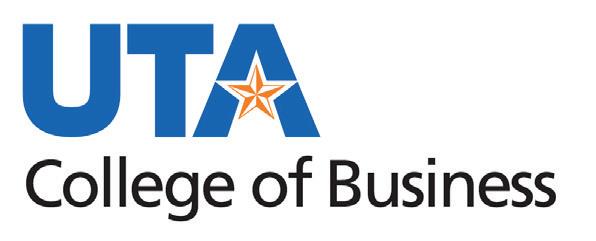
UTA COLLEGE OF BUSINESS MAGAZINE ISSUE NO. 6, FALL 2024
COLLEGE OF BUSINESS LEADERSHIP TEAM
Harry M. Dombroski, Dean
Dr. Greg Frazier, Senior Associate Dean
Dr. Myrtle Bell, Associate Dean for Access and Achievement
Dr. Wendy Casper, Associate Dean for Research
Dr. Fernando Jaramillo, Associate Dean for Students and Programs
Valerie Moore, Assistant Dean of Development
Rebecca Neilson, Assistant Dean
MAGAZINE STAFF
Editor: Rebecca Neilson
Publication Consultants/Writers: Hardee Partners, LLC
Supporting Staff: College of Business, Dean’s Office
Contributing Photographers: Ellman Photography, Jalen Larry
Contributing Writer: Thomas Johns
Designer: Cynthia Wahl
The Business Maverick magazine is published once a year by UTA College of Business for alumni, faculty, staff and friends of the college. Reproduction in whole or in part without written permission is prohibited.
The comments and opinions expressed in this magazine do not necessarily represent those of The University of Texas at Arlington or the faculty of the College of Business.
For more information, contact Rebecca Neilson, College of Business, 817.272.2643
The College of Business is developing four new undergraduate degree programs and modifying existing master and PhD degrees to make them more accessible for students and to extend
UT Arlington’s offerings to Panama, Brazil and India.
The undergraduate degrees are in varying stages of review, said marketing professor Fernando Jaramillo, associate dean for students and programs. The four degree proposals include:
■ Bachelor of Business Administration (BBA) in human resources management:
“We have a very good HR program at the graduate level,” Dr. Jaramillo said.
“And we have world class researchers in HR. So, it makes sense to also have a bachelor’s degree.”
■ BBA in entrepreneurship:
“Many students don’t want to work for someone else; they want to work for themselves,” Jaramillo said. “We are going to train them on building and managing their own business. They’re going to get snippets of basically every aspect of business such as finance, management, information systems.”
■ Marketing degree in consultative sales:
“This is business-tobusiness sales,” Jaramillo said. “Students will be trained to analyze and identify business problems and then use consultative sales to solve the problems.”
■ Degree in hospitality management:
This program addresses management needs driven by significant growth in the Dallas-Fort Worth area in sports, restaurant and hotel businesses, Jaramillo said.
Each of these programs go through a design and approval process that includes reviews by the College of Business, the University, the University of Texas System and the state’s Coordinating Board. Once approved, information is then provided to the Southern Association of Colleges and Schools. The programs potentially could be available for enrollment by spring of 2025, Dr. Jaramillo said.
The master program in business analytics will extend course offerings for the first time in Panama City, Panama. Provost Tamara Brown, Dean Harry Dombroski and Jaramillo recently flew to Panama to sign a letter of agreement with Ciudad de Saber, a government-sponsored group of academic organizations, technology companies and non-governmental organizations, located in what used to be U.S. Army property.
“The president of Panama said his country was going to change soldiers and weapons for students and books,” Jaramillo said. “They converted barracks to the City of Knowledge.”
College of Business professors will teach analytics courses in Panama.
Jaramillo said the college also is partnering with institutions in Brazil and India to adapt the PhD program and allow students greater flexibility in where they take coursework. This makes the program more efficient and cost-effective for students who might not be able to afford moving to Arlington for all four years, Jaramillo said.
Jaramillo said he has worked out PhD agreements with two universities: Pontifícia Universidade Católica do Paraná, a private, not-for-profit Catholic university in Curitiba, the capital city of the State of Paraná, Brazil, and Great Lakes Institute of Management, one of India’s business schools. “This will increase our portfolio of degrees to better serve students’ and market needs. Overall, this is part of the strategy of transforming lives through knowledge,” said Jaramillo.

Lars Johnson, an assistant professor of management, is leading a taskforce that, in consultation with the National Education Agency (NEA), is researching potential solutions to a national teacher shortage for pre-kindergarten through 12th grade.
The research is part of an initiative by the American Psychological Association’s (APA) Coalition for Psychology in Schools and Education (CPSE). Dr. Johnson teaches classes at UT Arlington on evidence-based management, human resource management and structural equation modeling. He has a degree in psychology and worked as a high school special education department chair and math teacher.
“I’m leading a task force called the Changing Workforce for Teachers,” Johnson said. “The goal is to generate insights and potentially identify resources for school districts, education agencies and other folks in different levels of education to support teacher recruitment and teacher retention.”
Johnson’s committee is designing a nationwide study that he hopes will be launched in the fall. “We’re hoping to get feedback from tens of thousands of teachers, not only about their experiences but some of the factors that are keeping them in the profession, that brought them to the profession and reasons why they
Brampton Supply Company, founded by College of Business alum Andrew Feghali, was recognized as the fastest growing UTA alumni-led business at the fifth MAVS100 event in May. The annual recognition ceremony highlights the economic impact of the top 100 alumni businesses, which this year generated an estimated $782 million in revenue.
Andrew Feghali, with his wife Laura, received the top award from Dean Harry Dombroski at the annual MAVS100. Scan the QR code to watch highlights of the ceremony.

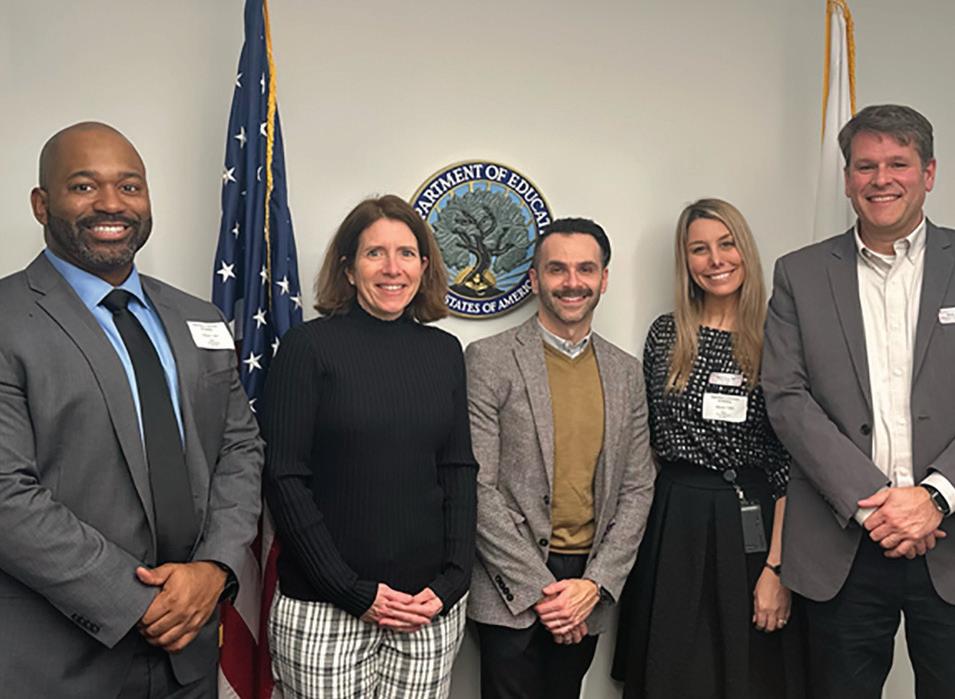
might leave,” he said.
Researchers particularly want to hear from the next generation of potential teachers.
One major issue is pay. Johnson said he would like to see the research identify “tools to help those in educational leadership address this issue right now.”
Johnson was appointed to serve as the Division 14 representative for the CPSE. His division, the Society for Industrial and Organizational Psychology, focuses on work-related issues in and beyond the workplace.
He met recently with leadership from the Department of Education and President Biden’s special assistant for education at the White House to discuss how data from the study might be used to inform federal guidelines.
“It was a kind of round table discussion about what we were doing and how we could interface with them,” Johnson said. “They were very interested in what we’re doing.”
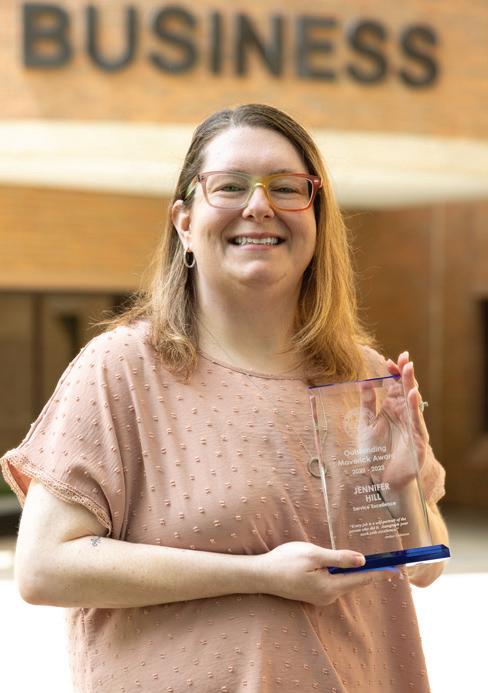
Jennifer Hill, an administrative assistant II for the Information Systems and Operations Management Department, has been recognized with a UT Arlington Outstanding Maverick Award for Service Excellence in the 2022-2023 academic year.
Hill developed a step-by-step course to help administrative staff do their jobs. She also compiled a resource list for staff that provides contacts and job aids.
Hill was also recognized for her willingness to help others. She is often the first to volunteer when a co-worker is out for an extended period, or an administrative position is vacant.
The award comes with a $2,000 check.
Through a consulting partnership with the Department of Finance and Real Estate, The Barron Companies of Fort Worth has launched new software designed to improve financial modeling for complex commercial development projects.
The idea for better technology designed from a real estate developer’s perspective has been rumbling around in Greg Barron’s imagination for years.
Barron is chief executive officer and president of The Barron Companies, a 1991 graduate of the College of Business, a Distinguished Alumni of the Year honoree in 2010 and past member of the College of Business Advisory Council. He believes the company’s new software, ProformaPlus, (https://www.proformaplus.com) achieves his vision for building a better solution.
“It is a very fast, efficient and accurate tool to do financial valuation modeling for all asset classes of commercial real estate, and that means multifamily, retail, office and single use,” Barron said.
Barron recognized the need for a better, more standardized modeling tool after years of development experience and as a regional bank director responsible for assessing the viability of proposed projects. Developers commonly use Microsoft Excel spreadsheets when building their financial projections.
“The difficulty is that you’re dealing with 15 to 20 Excel pages with circular data input, and it’s fraught with errors because you could at some point have errors in the manipulation of formulas,” Barron said.
Bob Kline, Barron’s chief financial officer who has computer programming experience, quickly saw the difficulties and proposed that the company design its own software that still incorporates industry-standard spreadsheets but with code written in the background that links them in a relational database.
Kline said Excel spreadsheets are excellent for
analytics, but he knew many projects required a better relational database. “The more complex your worksheet becomes, the more it really lends itself to a relational database program because of the intricate structure of the data that you’re trying to organize,” Kline said.
Over the next couple of years, the company designed the software and fine-tuned it in collaboration with members of the college’s real estate department, including chair Sanjiv Sabherwal and professors Andy Hansz and Sriram Villupuram. Dr. Hansz acknowledged that, when he and others from the department were first asked to review the software, he was skeptical.
“We go to Mr. Barron’s office in Fort Worth, and they do a demonstration,” Hansz said. “We were like, wow, this is not a spreadsheet template. This is a very impressive, sophisticated piece of technology. I think they’ve come up with a clever solution. The software is compatible with spreadsheets, and you can still analyze simple properties with a spreadsheet. However, for more complicated properties, including most development analysis, it’s almost impossible to do the financial analysis on just a spreadsheet.”
Another game changer, Hansz said, is how easy the software is to learn. Hansz had one of his master’s students test it out. He learned the software in two days and then presented a financial analysis to a venture capital firm. Typically, Hansz said, it takes a semester for students to learn Argus, the industry-leading software for commercial property valuation and asset management.
“Entering the information is pretty easy,” Hansz said. “It is cloud based, and it’s compatible with Argus.”
Barron said he believes such collaborations with the College of Business help not only the company but students at UT Arlington.
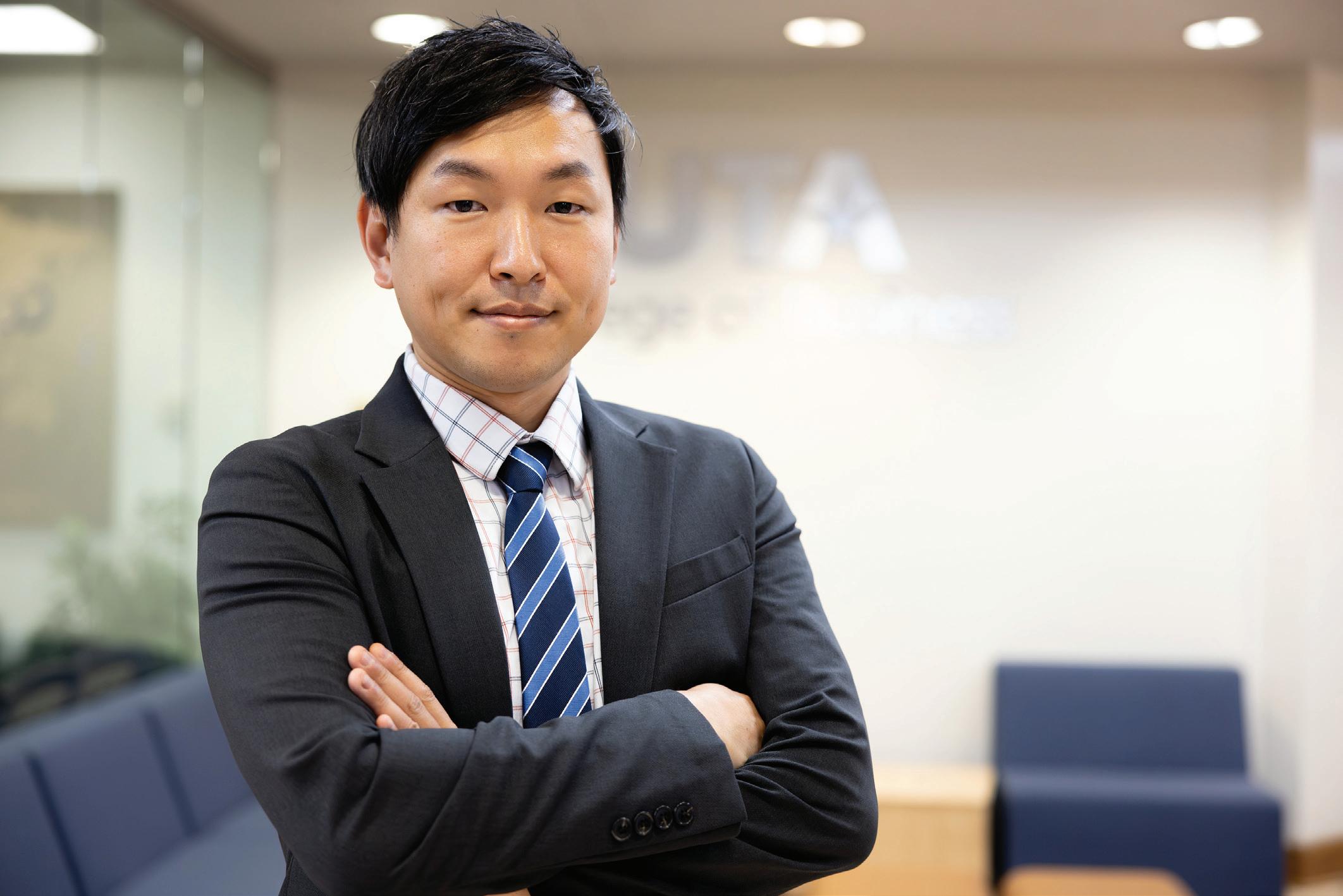
By Thomas Johns thomas.johns@uta.edu
Hanbo Shim, an assistant professor of management, has won a prestigious award from the Academy of Management presented for research dissertations that have contributed to solving significant obstacles in the field of human resources.
Dr. Shim received the Ralph Alexander Best Dissertation Award, given by the academy’s Human Resources Division, at the 84th Annual Meeting of Academy of Management (AOM) in August. His dissertation examined ways in which employee job performance is captured at both short-term and long-term levels.
“This study highlights the importance of more frequent or short-term performance feedback so that employees can make more effective behavior decisions
on the short-term basis,” Shim said. “It also informs individual employees about what would be the detailed and ideal profile of short-term performance behaviors to win more favorable rating in the long-term.”
Through his research, Shim found that there was a deep correlation between short-term tasks and long-term employee ratings.
“Individual’s short-term performance behaviors, such as performing his or her own tasks or helping others’ tasks, can lead to different levels of long-term performance with different patterns,” Shim said. “This implies that the momentary decision that you make every day or every week, in terms of how you work, can create differences in your annual performance ratings.”
The annual award is for dissertations presented within the last two years. The AOM Human Resources Division is one of the academy’s largest with more than 3,300 members and is dedicated to understanding and improving the efficiency and effectiveness of HR practices.



by Ellman Photography
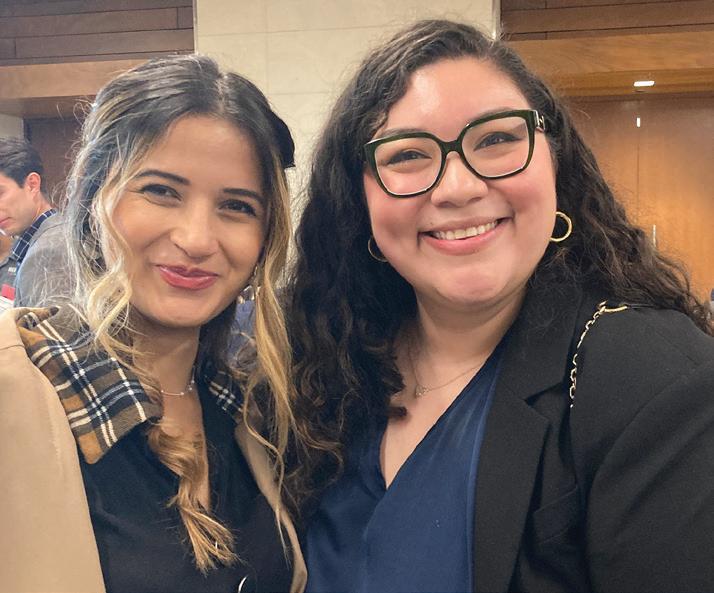

IF THERE IS A SHARED EXPERIENCE that runs across each student cohort throughout the 20-year history of the Goolsby Leadership Academy (GLA), it certainly is the sense of discovery.
The discovery of business principles, ethics and leadership.
The discovery of an increasingly complex and multicultural world.
And perhaps most importantly, many Goolsby scholars say, the discovery of self.
“Leadership is all about understanding who you are and creating confidence in yourself,” said Anavaleria Monzon, a 2016 graduate and member of Goolsby’s cohort 11 who now works as an analyst in the

human relations office of the Catholic Diocese of Dallas. “That’s what leaders are: people who are confident in what they’re doing and willing to guide [others], and that’s really been driving my career to the point where I am now.”
The Goolsby Leadership Academy is celebrating its 20th anniversary this year. At a gala in April, the university recognized current and graduated students, faculty and the namesake benefactors, John and Judy Goolsby. The couple directed an anonymous $2 million donation to UTA, which helped launch the academy and establish the Goolsby Distinguished Professorships.
John Goolsby graduated from UT Arlington with an accounting degree in 1964. He eventually became the president and chief executive officer of the Hughes Corporation, directing a sprawling business empire left in the wake of billionaire Howard Hughes’ death. After his long career, Goolsby saw the need for a leadership academy founded on three pillars: integrity, courage and impact.
James Quick, professor emeritus and the first GLA director, said helping students discover their own leadership potential was from the beginning an important leg in what he called the academy’s educational tripod.
“That tripod had the scholars at one point,” Dr. Quick said. “A second order of the tripod was the faculty, and the third was executives.” Faculty provided academic scholarship and teaching. Executives brought real-world experiences. Students examined themselves through self-assessment, using a set of “social/ emotional skills that are used by executives,” Quick said.
Student self-discovery will always be an important aspect of the GLA, said Cynthia St. John, the academy’s current and fourth director. “They appreciate the focus on strength-based leadership and helping them understand what their strengths are, so that they can better understand what they bring to a team, to a leadership situation,” Dr. St. John said.
Shradha Reid, who like Monzon graduated as a member of cohort 11, echoed that sentiment.
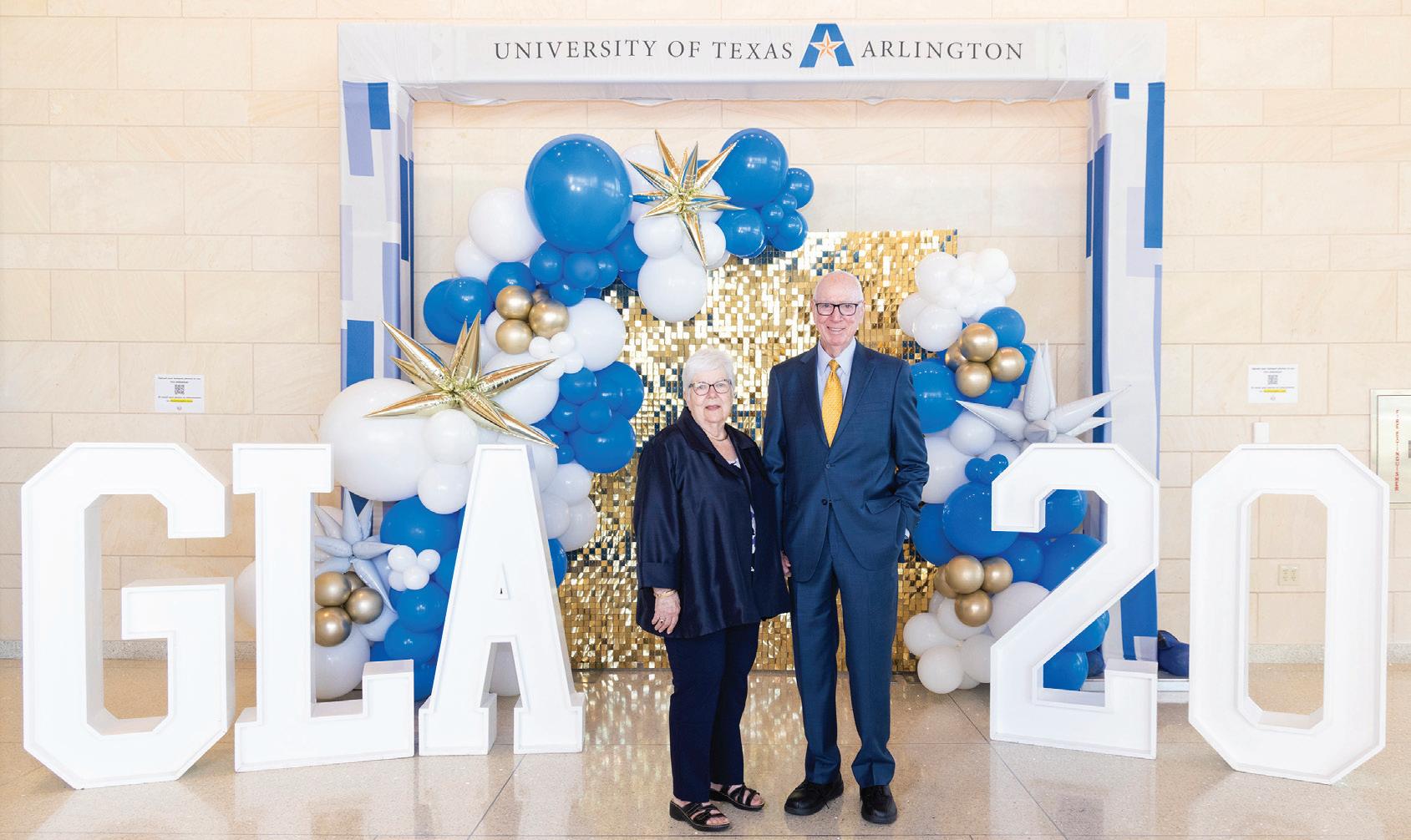
Reid graduated with a degree in international business and now works as an associate director of cybersecurity in Dallas for the Depository Trust & Clearing Corporation, which provides a range of services for posttrade markets in securities, syndicated loans, insurance transactions and alternative investment products. She said she now employs the leadership skills she discovered in herself during her years in the Goolsby academy.
“The most significant thing was just understanding the foundations of leadership that I needed to hone for myself,” Reid said. “Not just the strengths that I had, but other elements of what it takes to be a leader. Now I get to practice that with my teams.”
A member of cohort 20, Sandya Magar sees how she has benefitted already from involvement in the GLA.
“I just completed a year and have one more left,” said Magar, a finance major who moved from Nepal when she was 10 years old. “I feel like Goolsby has really transformed me in a good way. I say this because I feel like I’ve changed a lot in terms of gaining confidence, especially in my presentation skills, my communication skills. I definitely think that Goolsby has made me feel more confident in my leadership skills.”
Such growth delights Assistant Dean Rebecca Neilson, who has taught those skills to GLA scholars since 2007.
“It was exciting to see all the students at the 20th Goolsby Leadership Academy anniversary,” she said. “It has been fun to watch them grow and learn what their leadership style is. I tell the students I can’t
make you a leader, but I can teach you how to be successful in the business world.”
Catherine Campos, a member of cohort 19 who graduated in May with a focus on international business, needed such guidance when she was figuring out how to get where she knew she wanted to be. Born in Chicago, Campos spent her childhood years in Mexico before moving to Texas. She is the first in her family to attend college.
“I had a goal in my mind, but I didn’t know how to get there,” Campos said. “And it wasn’t like I could just go home and ask my parents because they wouldn’t be able to give me guidance. So, I was trying to find ways to be a part of an organization that would give me the kind of guidance on where to go and what I wanted to do.”
That, she learned, is the Goolsby Leadership Academy.
Campos heard Jerry Hubbard, director from 2016 to 2023, talk about the pillars of the academy and she knew she wanted to be a part of the program. She said she not only gained confidence from professors but from students in her cohort as well.
“I never saw myself as the leader,” Campos said. “I was in the academy more for the skills and the learning, but one of my peers saw in me that I could be a leader.”
That encouragement bolstered Campos.
“I definitely tapped into something that I had in me that I didn’t know I did,” she said. “It’s crazy to see how we started and then how after two years we’re all confident.”
For London Walker, also a member of cohort 19 who graduated in May with a degree in finance, the GLA not only helped him discover his strengths but opened his eyes to a broad world of possibilities as well. The environment on campus and the opportunity to study abroad through the academy exposed this small-town Texas lad to the world’s diversity.
“The best decision I made was joining Goolsby,” Walker said. “I remember the first time I walked into the business building. Just walking from my class and then out back to my car, I probably heard at least seven or eight different accents. I didn’t know people, didn’t know how they lived. So, I really enjoyed that I was exposed to that.”
St. John hears many of the same student stories and plans to enhance those experiences.
“I would say that what I hear most from students is that it’s a really unique environment because it’s cohort based,” St. John said. “They not only appreciate
608
Number of students accepted (includes everyone from cohort 1 to cohort 20)
449
Number of students who graduated Goolsby (from cohort 1 to cohort 18)
41
Number of countries our students come from
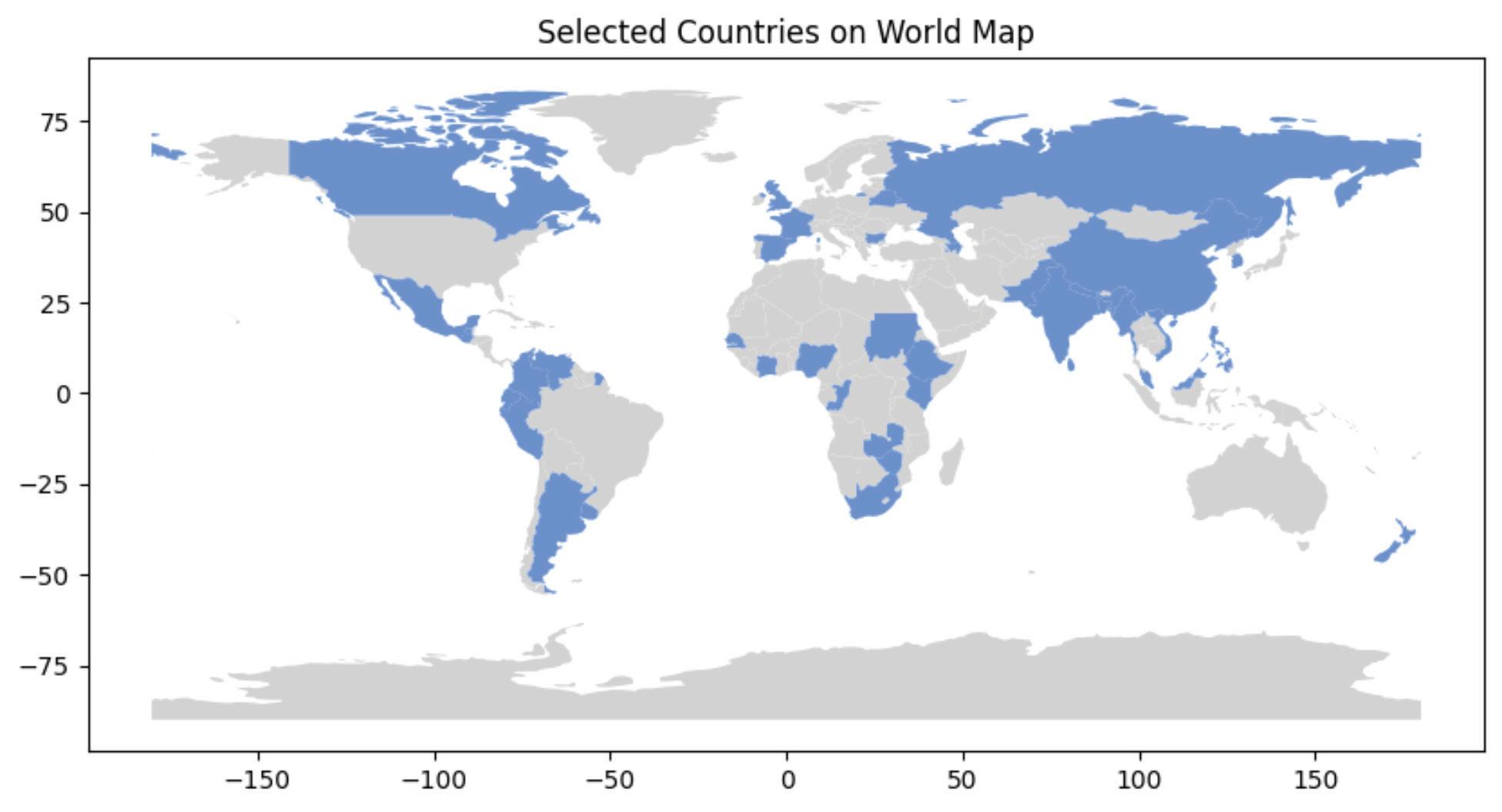
Argentina, Azerbaijan, Bangladesh, Belarus, Bulgaria, Canada, China, Colombia, Congo, Côte d’Ivoire, Czech Republic, Ecuador, Ethiopia, France, Grenada, Guatemala, India, Kenya, Malaysia, Mexico, Myanmar, Nepal, New Zealand, Nigeria, Pakistan, Peru, Philippines, Russia, Senegal, South Africa, South Korea, Spain, Sri Lanka, Sudan, United Kingdom, United States, Uruguay, Venezuela, Vietnam, Zambia and Zimbabwe.
Note: Sixty-seven students active in the academy are completing their degrees. Seventy-four students have graduated but did not complete the Goolsby program.
the cohort nature, but I’ve heard them say quite a bit that they appreciate being with other like-minded students who are high achievers. They push each other to excel and perform beyond what they might otherwise have done if they were just in a regular classroom environment without the cohort.”
St. John also hears how the program helps them discover and understand what their strengths are and what leadership talents they can bring to a team.
“We can’t be all things to all people,” St. John said. “There are a few things that we’re generally really good at relative to others. Those are our unique core strengths. So, I think understanding and leveraging what those are is something that our scholars see value in. We intentionally focus on not just the technical side of leadership, but even more so on the human side of leadership which is so important.”
Scholars in the academy complete
the Clifton Strengths assessment, which was developed by University of Nebraska professor Don Clifton and launched worldwide by Gallup in 1999.
To add to this introspective experience, St. John will introduce layers that help students build what she calls the three Cs: character, competence and confidence. The three Cs, St. John said, support the academy’s mission of developing integrity, courage and impact.
St. John will add a student version of the Leadership Practices Inventory (LPI), created in the early 1980s by James M. Kouzes and Barry Z. Posner to identify effective practices common in corporate leaders.
She also plans to use the Leadership Character Insight Assessment (LCIA), developed by SIGMA Assessment Systems and the Ivey Business School, ranked by Financial Times as Canada’s top business college. LCIA is designed to measure
leadership character and provide practical insight for development.
“In terms of character and competence, once you’ve built those two, the confidence will come,” St. John said.
St. John said the college is exploring the possibility of adding a corporate board of advisors who can further identify their priorities for leadership skills. Dr. Quick is also one who favors more involvement from leaders from the business world.
“I would tell the students you are not in an academic discipline, you are in a professional college, so an important part of your education in a professional college is with the people in the practice community outside the college,” he said.
Every initiative, St. John said, is designed to continually develop scholars during each of the potentially four years they participate in the academy. This “allows a much deeper relationship and interaction than a traditional classroom setting,” St. John said.
by Ellman Photography
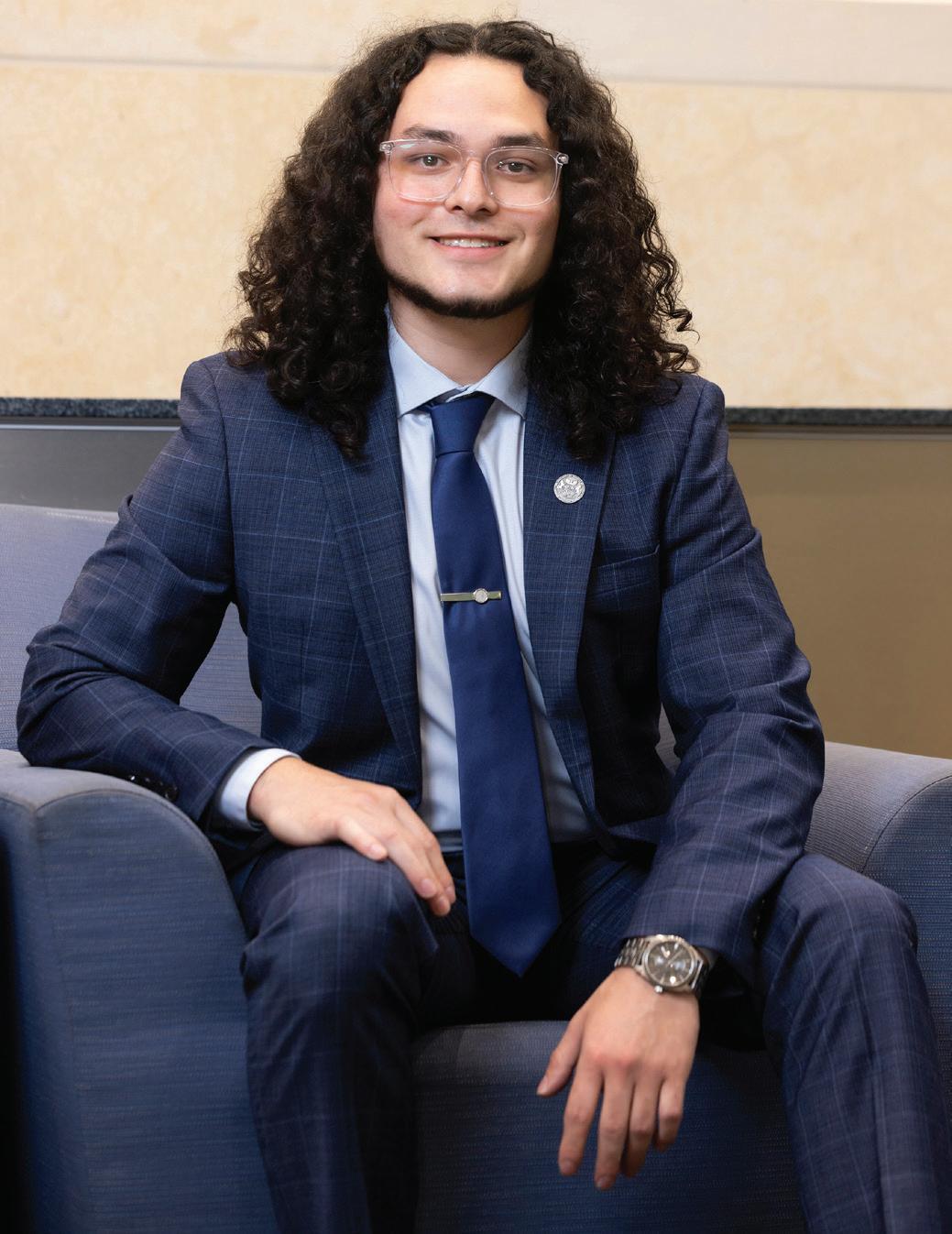
In its brief, four-year history, the Dean’s Leadership Circle (DLC) has raised over $641,000 and awarded scholarships to 60 College of Business students. At first glance, the benefits are readily apparent.
Tuition. Books. Other college expenses. Recipients are quick to gratefully acknowledge the much-needed financial assistance, especially those who work part-time to pay for full-time coursework.
But, recipients say, the scholarships benefit them in other, notso-apparent ways, from freeing time to nurture career opportunities to just nurturing their confidence that hard work, indeed, pays off.
“Not having to do extra [part-time] work was very helpful in my time management,” said Alexis Jauregui, who was given one of the first DLC scholarships in 2020. He graduated in May with a bachelor in business administration in international business Chinese.
“Just giving me extra time to do other things at UTA on my own and the networking opportunities that go along with it are also very rewarding,” Jauregui added. “I got to meet a lot of great people from all different industries and other students who recently graduated. I got to speak with them on how they have continued their education and about their work life.”
Jauregui, who immigrated from Mexico and graduated from high school in Houston, is one of the 20 scholarship awardees who have graduated so far. Twenty other scholarship students are currently enrolled.


Junior Zaina Taher is an accounting major who grew up in New Jersey but spent years in Dubai, the United Arab Emirates. Like many of her fellow students, she appreciates the international business environment at UTA that complements her high school experiences.
“Because I went to school in Dubai, one of the things that I was very afraid of coming here was that I was behind,” Taher said. “I was scared that I wouldn’t stand out or wouldn’t be recognized for the efforts that I put in during high school. And the Dean’s Leadership Circle
Senior finance major Sandya Magar, who immigrated when she was 10 years old from Nepal, received a DLC scholarship as a freshman.
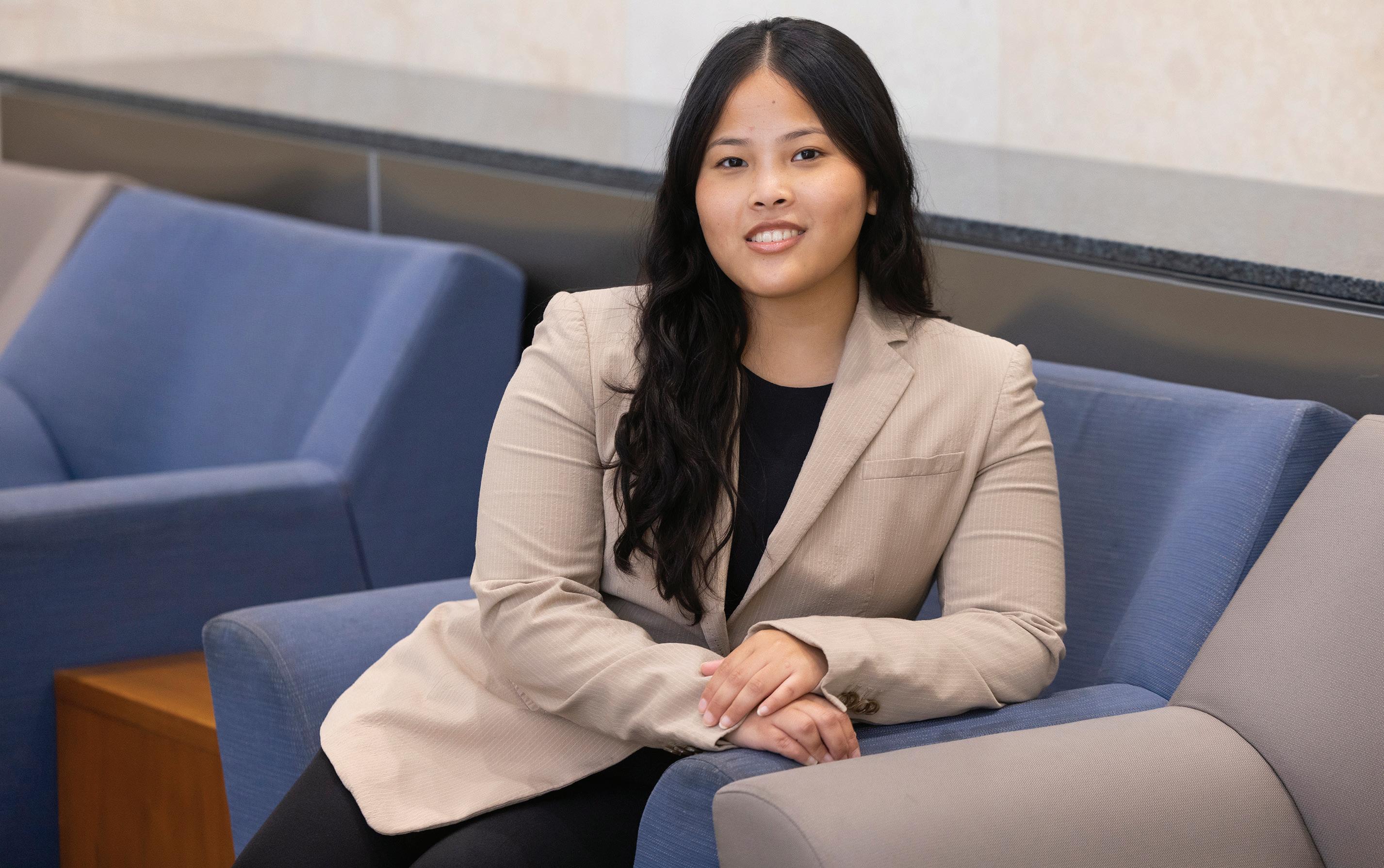
scholarship was one of the first scholarships that I received. And, so to me, it was recognition that I do work hard, and I do put in a lot of effort.”
And, she quickly added, not to mention the financial support.
“It helped me take off some of the financial pressure,” Taher said. “For myself and for my parents.” She comes from a family of 10. Her older sister just graduated from college. Her younger brother is enrolled. “So, it meant a lot telling my dad I got the scholarship, and it’s for excelling as a student. He was very proud and obviously very relieved,” Taher said.
Senior finance major Sandya Magar immigrated with her family from Nepal when she was 10 years old and finished elementary, middle and high school in Fort Worth. She received a DLC scholarship as a freshman, which allowed her to stay close to her family while pursuing her interest in financial investments.
Just as important as the financial support, Magar notes, are the career advice and opportunities that came with newfound DLC connections. She distinctly remembers a DLC event in her sophomore year where she spoke to donors.
“I remember that event clearly because it really helped me, especially talking to the
donors,” Magar said. “They were telling me about certain programs that I should join or certain things that I should look into, and I thought that was very helpful.”
The advice led to Magar joining the Goolsby Leadership Academy. She is a member of cohort 20, will graduate in spring 2025 and is working part-time at financial investments company Charles Schwab. She also connected with other like-minded, motivated scholarship recipients.
“I would say the other recipients, getting to meet them as well, learning about what they’re studying and what they want to do for their future, was also nice,” Magar said. “The scholarship helped me form connections with the other recipients.”
Dean Harry Dombroski appreciates such feedback.
“The DLC was conceived as a scholarship program to provide alumni and supporters the ability to directly support high-achieving students throughout their academic journey at UTA,” he said. “Since 2019, over 129 alumni have contributed significantly to the DLC, allowing our scholarship recipients the freedom to pursue their chosen area of studies. We are extremely fortunate to have so many alumni that understand the importance of giving back and supporting the next generations of Mavericks.”
It helped me take off some of the financial pressure. For myself and for my parents. So, it meant a lot telling my dad I got the scholarship, and it’s for excelling as a student. He was very proud and obviously very relieved.
— Zaina Taher
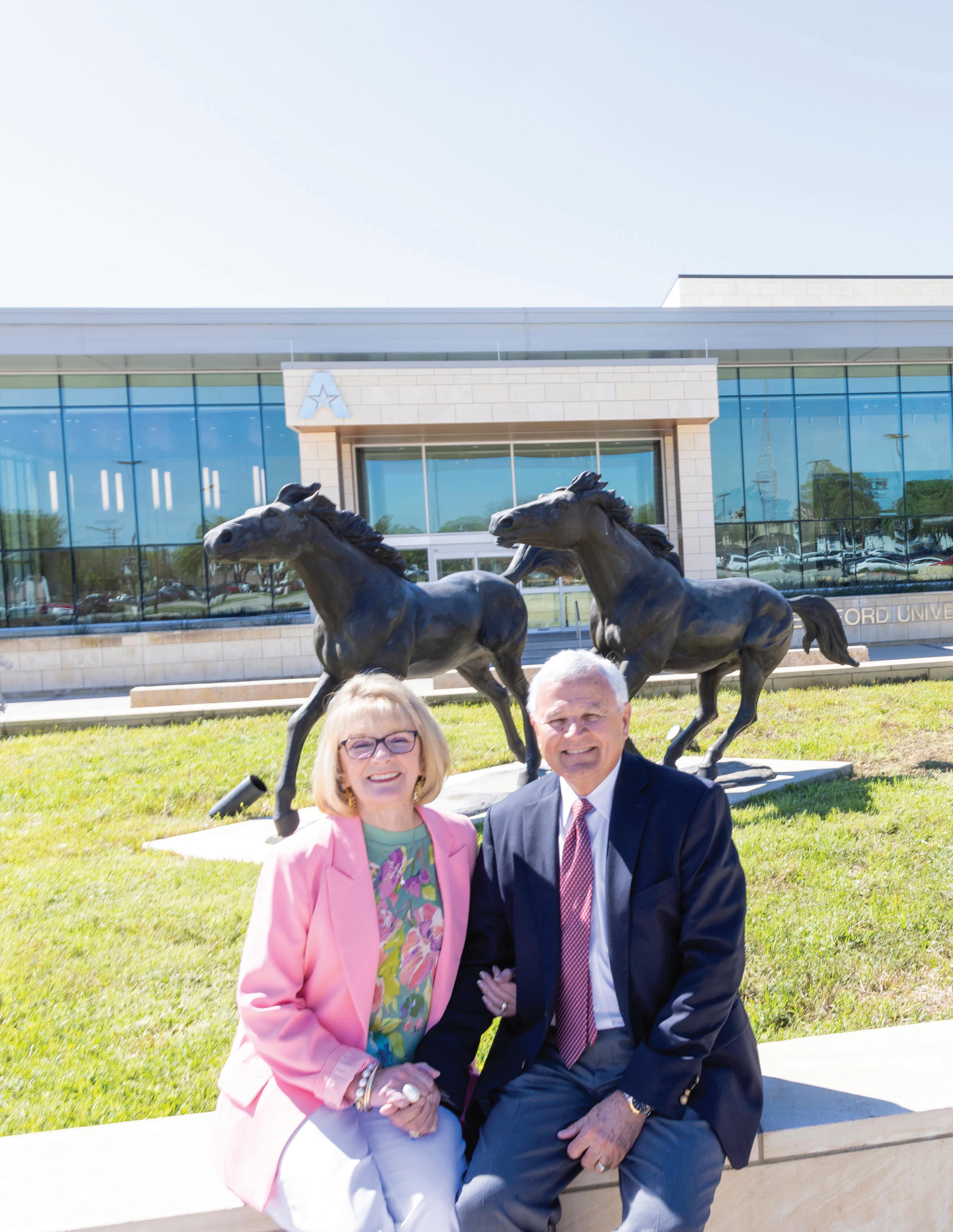
When Jimmy Campbell retired from banking, he and his wife knew they wanted to pay their good fortune forward. The College of Business was a natural choice.

As Jimmy Campbell walked with his wife, Cathy, through the E.H. Hereford Center, little remained of UT Arlington’s center for student life as he remembered it.
Renovations that transformed the building into a shining campus star started in 2019, long after Campbell graduated with a Bachelor of Science degree in math in 1971.
Still, despite the dramatic changes, a wistful memory drifted back as he and his wife of 52 years strolled hand-in-hand.
“I drank gallons of coffee in this building,” Campbell recalled.
He had to. His college days started early with a 35-mile drive from Cleburne. Seven guys jammed into two cars and heading to UTA for 8 a.m. classes. Maybe there would be
time for a burger before rushing back. “We each had a job that we had to be back for,” Campbell said. “We didn’t have a lot of free time.”
The loop between Cleburne and UTA became a lariat that, over the next four years, would rope the Campbells to both their hometown and their favorite university. In 2015, the couple cinched the relationship tighter with a $250,000 donation to create the Jimmy and Cathy Campbell Endowed Scholarship Fund in the College of Business.
Their contribution was supported with a matched amount from the university. Unsurprisingly, the scholarship is available to Cleburne High School students who graduate in the top 10% for their class and who enroll in the College of Business.
Campbell said he had scholarship money that helped him get his degree, and after long successful careers –Jimmy in banking, Cathy in child advocacy services, both of them in the cattle business – the couple decided they wanted to do something that continued the kind of support they received from family, neighbors and mentors.
“We both have good, strong families,” Campbell said. “We’ve been touched by some really powerful mentors growing up, not just in school but just, you know, church or whatever. We met some powerful people who guided you.”
And what better way to pay that guidance forward, the couple decided, than linking their hometown to “the well-kept secret” that is UTA, a university that they believe outshines its reputation.
London Walker, for one, is grateful the Campbells feel tied to UTA.
A Cleburne High School salutatorian, Walker wasn’t quite sure where he wanted to continue his education until, at his mother’s insistence, he checked out a college fair at the high school. He met the Campbells, and they instantly won him over on UTA.

“They were at the table with the recruiters from UTA,” said Walker, a Goolsby scholar and finance major who graduated in May and headed off to an internship with the Federal Deposit Insurance Corporation (FDIC). “They were the first table we walked up to. I didn’t talk to any other colleges that day. And they mentioned the scholarship. I applied. I got it, and I really couldn’t pass it up.” It became a full ride for Walker.
The Campbells no doubt have an ability to win people over. They’ve been doing it for years in Cleburne, a town of about 34,000 people southwest of Arlington.
“Jimmy just knows everybody,” Cathy said, something he learned from his mother, the assistant to the superintendent for the Santa Fe railroad, which put Cleburne on the map. “She supervised 1,200 men,” Jimmy said. “She knew everybody.”
Jimmy spent 46 years in the banking business, starting as a teller. He climbed the ranks, becoming the president of the First State Bank of Cleburne in 1980. Then he led the First National Bank of Cleburne.
He was hired to start a Small Business Administration lending department at the Bank of North Texas, which he did until it was sold in 1995 to First Interstate, then Wells Fargo in 1996. He was at Community Bank, which was sold to Northstar Bank, where he spent two years. He retired in 2016 and received the Outstanding Banker Award from the Tarrant County Bankers Association in the same year.
A big city outfit, Texas Commerce Bank in Houston, once tried to woo him down southeast back in the mid ‘70s.
“They put us up in the hotel,” Jimmy said over plates of home cooking at Cleburne’s Our Place restaurant. “It was a five-story building with a lobby with all this granite and all. I went through the interview. They told me, here’s kind of where you ought to think about living.”
He looked over at Cathy. “We drove around for what, an hour or two? Finally, we looked at each other and said
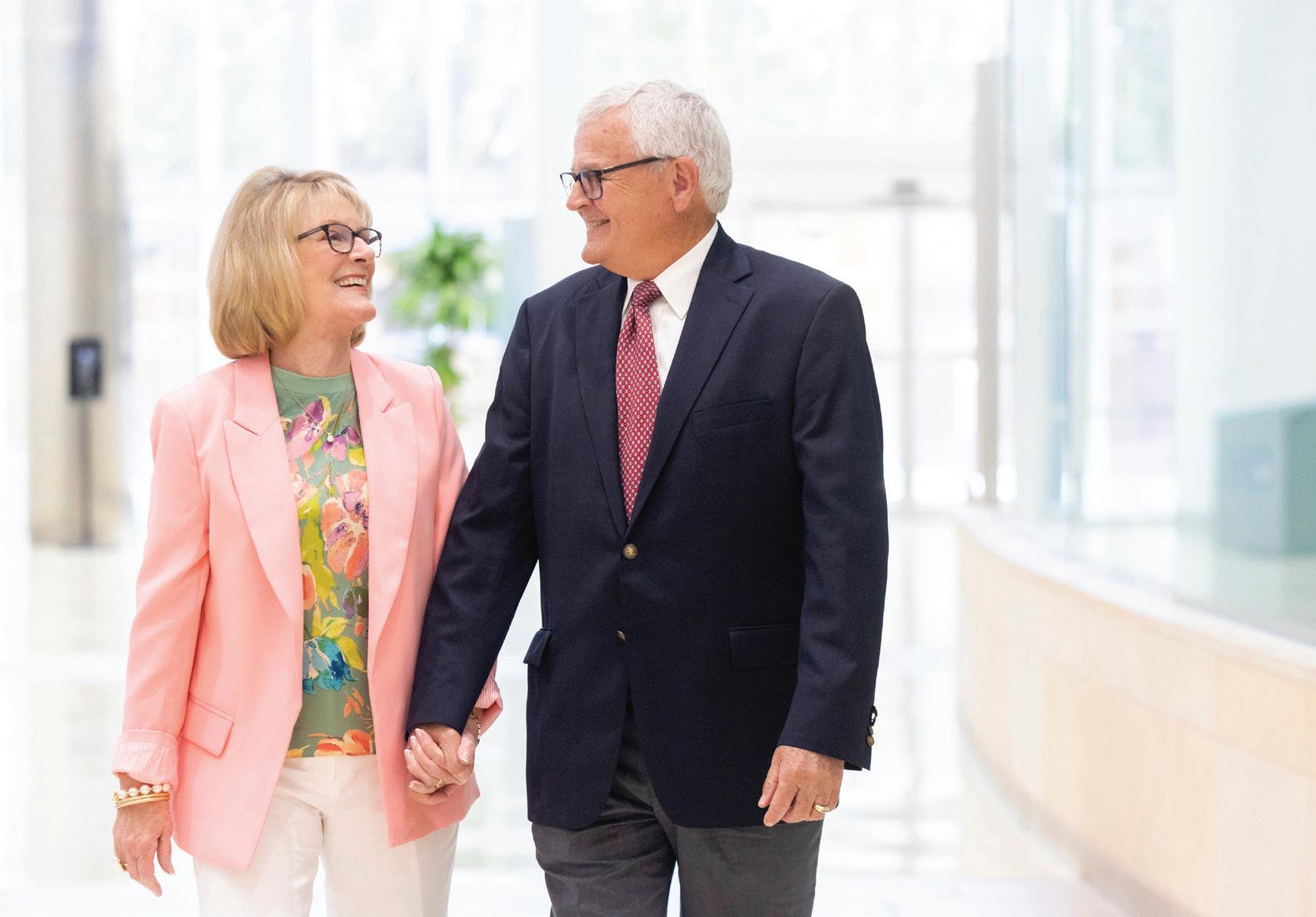
what are we doing?”
The pull of Cleburne was too strong. UTA, too. Jimmy would return to complete an MBA in 1979.
In the meantime, Jimmy would add president of the Cleburne Chamber of Commerce and the Cleburne Industrial Development Foundation to his resume. He served in a variety of roles with the Texas Bankers Association and the Federal Reserve Bank of Dallas Community Depository Institution Advisory Council. He is on the wall of fame for Cleburne High School and the chamber. He received the Lifetime Achievement Award from the North Texas Association of Government Guaranteed Lenders, the American Bankers Association Cornerstone Award and the Fort Worth Chamber of Commerce Vision 20/20 Award.
All while working cattle on weekends. Jimmy and Cathy once owned as many as 125 cattle. “That became a fulltime job,” Jimmy said. “I mean, you spent every waking hour on Saturdays and Sundays. You got up early and went to bed late doing nothing but fixing gates, working cows.”
To hear Jimmy tell it, Cathy is the real force in this one-time Cleburne power couple.
Like her mother, when Cathy sees a
need, she goes out to fix it, especially if it involves children. She started her career with the state’s child protective services. Eventually, she wound up on the Child Advocacy Center of Cleburne’s board of directors. In 2006, she received the Team Excellence Award by the Children’s Advocacy Center of Texas in Austin, an award presented to one volunteer board member statewide.
She also served on the Cleburne chamber board and helped launch the first business expo, serving as its chair for 11 years. The chamber honored her as an outstanding volunteer for her service to the city, county and chamber.
So don’t mistake her demure smile and soft-spoken style. She knows how to twist an arm or two to fundraise for good causes.
Jimmy chuckled at the mention of it.
“Let me tell you something. My buddies would call me and say …” he started before Cathy, as longtime couples often do, jumped in to complete his thought. “I took advantage, and they wouldn’t turn me down either,” she said.
Jimmy jumped back in. “They’d say, would you please make your wife quit coming by here.”
Cathy laughed and added, “Oh, I got lots of money.”
The couple has always believed in the power of education.
Jimmy affirmed that assertion: “Oh yeah, they’d just write her a check.”
It shouldn’t surprise, then, that the College of Business scholarship was, Jimmy said, Cathy’s idea.
“We’d been thinking about it, but she’s the one who said it first, and then we tried to figure out how to fund it,” he said.
The couple has always believed in the power of education. Jimmy led several successful Cleburne school bond election campaigns. He experienced first-hand the value of a degree from UTA. He appreciates how the College of Business strives to provide a practical education and prepare students for the workforce.
These days, Cathy and Jimmy have slowed down a tad. They live out in the country because, well, Cleburne is just becoming such a big city. Still, they continue to step up when they see a need, like with the food pantry at St. Mark Methodist Church. Cathy is still fundraising and bringing Jimmy along to help. He makes food runs for the pantry.
“Life is good,” Jimmy said. “I told somebody the other day, we’re pretty happy with our lives right now. We help folks that helped us over the years.”
The UTA College of Business is glad to be counted as some of those folks who helped the Campbells.
PEGGY ESPARZA
Peggy Esparza, at the time a single mother of two, never thought she would attend college. But she did.
Although the journey was long, she persevered and completed her bachelor’s degree in accounting from UT Arlington in 2011. She became the first in her family to receive a degree.
Esparza wasn’t so sure she could earn a master degree. In fact, like many other students returning to grad school, she did not pass the GMAT exam on her first attempt. But again, she persevered. The College of Business saw Esparza’s talent and potential and admitted her to the MBA program. She finished her MBA in 2013.
As a part-time teller, she wasn’t sure what a career path in banking looked like. She just needed to be able to support her family. With encouragement from co-workers at Texas Trust Credit Union, who recognized her abilities, she seized on opportunities as they opened up, learning everything she could while going to school. Eventually she was promoted to senior vice president for accounting.
Today she is the chief financial officer.
She credits her faith, family, her mentors and the tuition reimbursement program at Texas Trust and the education she received at the College of Business for her success story.
“The flexibility of the courses I took was crucial. They highlighted the ability to balance these courses with work and my family commitments. I couldn’t have done this without that,” Esparza said. She added that UTA’s practical coursework helped open doors. “The coolest thing for me is I got to apply what I learned at UTA in real life, at work,” she said.
Esparza now hopes her story can fuel hope in others who might not know what they want to do or do not have someone who can guide them.
“It took somebody to believe in me for me to believe in myself,” she said.
Esparza grew up in Grand Prairie. Her parents, immigrants from Mexico, never completed high school. Both worked full-time, long hours, which meant Esparza from the fourth grade on helped with house cleaning, laundry, cooking and babysitting her siblings.
“Honestly, I mean, we never talked about college growing up,” she said. “It was always you graduated from high school, you get married, and you have a family.”
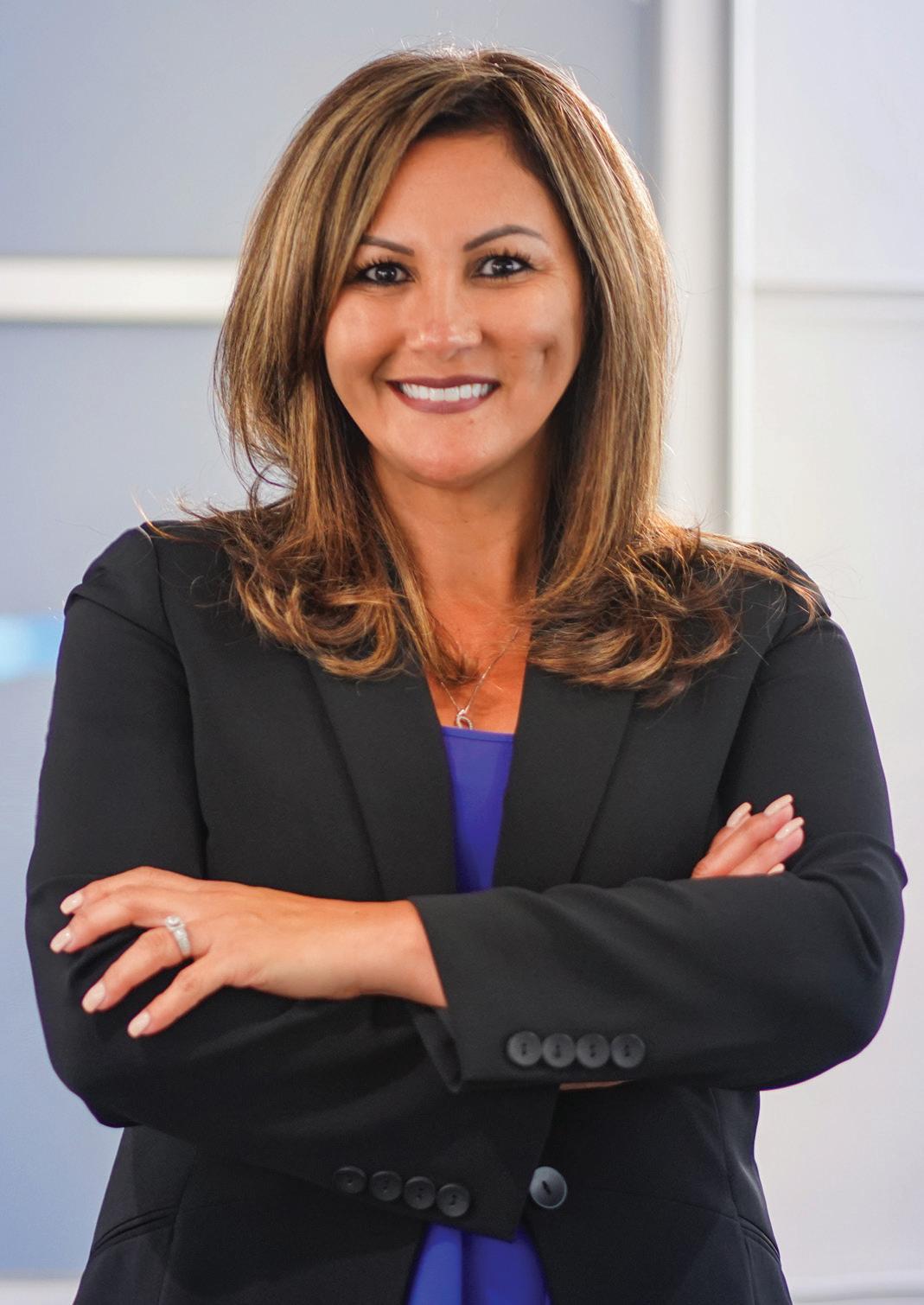
At Texas Trust, co-workers realized her potential and pushed her to apply for jobs for which she wasn’t sure she was qualified –especially without a college degree. Even as she rose, she battled, as she put it, her brain, the fear of the unknown and the “imposter syndrome” feeling.
Today, Esparza’s passion is mentoring others, particularly young Latina women like the young mother she once was. She wants them to know she’s been there. Her story is proof there can be a bright future.
In addition to her duties as Texas Trust’s chief financial officer, Esparza also gives back by serving as an advisory board member for the personal finance education program at the College of Business. She also is a board member of the Texas Trust Gives Foundation.
“My passion is paying it forward,” Esparza said. “There’s always somebody who’s just hesitant on what to do, what’s the next step for a single mom, a single dad or just somebody who just didn’t grow up talking about college. I’m just like you, with my own story to tell. There wasn’t a college path laid out for me growing up. In fact, high school graduation felt like the finish line. Someone saw something in me I didn’t even see in myself, and that sparked a fire – a fire for knowledge and a shot at a different future.”
Peggy Esparza is no imposter.
One perspective of Liliana PérezNordtvedt’s primary research could be to view it as, well, a time machine, one that, as you step through the theory and data, unveils meaning to the common corporate motto: Time is money.
“Yes,” said Dr. PérezNordtvedt, a College of Business professor of strategic management. “That is my first love, without a doubt. Time.”
Pérez-Nordtvedt quickly adds, “So if you look at my record of publications, I’m in different areas and not necessarily all of them about time, but without a doubt time is my passion. It has been since my very first semester when I started my PhD program.”
In academic terms, her time machine whirls around theories and frameworks for understanding time disruptions that can impact organizations, employees, and customers. In a recent article, Pérez-Nordtvedt and a colleague propose a model for understanding how employees adjust the time devoted to home and work demands based on disruptions. They offer a typology for the range of disruptions and identify three temporal-resilience-shaping responses. (See accompanying story, Page 19.)

Liliana Pérez-Nordtvedt
Professor – Management
2005 – PhD in Business Administration, The University of Memphis
1999 – Master in Business Administration, Indiana University of Pennsylvania
1998 – Bachelor of Science in Industrial Engineering, Universidad de los Andes
We take time for granted. Time is so real, and we see it every day when we look at ourselves in the mirror.
Time has real consequences, and I don’t believe we pay enough attention to it.
Pérez-Nordtvedt views issues of time management as an under-studied aspect of organizational theory and strategic management, which she teaches.
“I think almost everything I do is this idea of disruption and this idea of adaptation,” Pérez-Nordtvedt said. “You’re kind of in some sort of equilibrium, and then something comes in and changes it, and then what do you do and how do you react to it and what affects it?”
Those questions apply to all types of organizations and employee structures, notably multinational companies that operate in varied time zones. They relate to entrepreneurship, Pérez-Nordtvedt adds, as well as the current labor trends and gig economies.
“We take time for granted,” she said. “Time is so real, and we see it every day when we look at ourselves in the mirror. Time has real consequences, and I don’t believe we pay enough attention to it.”
From an organizational behavior perspective, PérezNordtvedt said, companies naturally focus on maximizing employee time and during temporal disruptions, such as the COVID pandemic, it is easy to fall into a trap of just expecting employees to do more, faster.
“But the piece that is missing here is the well-being of these workers and employees, and if they get to a point where they can’t stand it anymore, then they’ll quit,” she said.
When disruptions large and small create a temporal misfit for companies, employees and sometimes customers, this forces what Pérez-Nordtvedt identified as three temporal-resilience responses: adjusting, absorbing or adopting. She believes more research is needed to help organizations understand sound strategic responses to such disruptions.
“Organizations need to understand that because then they’re going to get employees to stay, and they’re going to get happier employees versus just demanding whatever they can from their time,” she said.
TITLE From Time Wrinkling to Time Razing Disruptions: Understanding Temporal Resilience, Academy of Management Review (2024)
PÉREZ-NORDTVEDT'S SUMMARY:
In this journal article in press for the Academy of Management Review, Pérez-Nordtvedt and her colleague propose a theory for understanding what types of temporal shocks can disrupt how well employees function in their jobs. They identify various coping strategies used as a result of those disruptions. PérezNordtvedt contends that understanding disruptions is critical to organizational management because they upend the rhythms that individuals develop to organize and make sense of their work. She suggests that disruptions will likely grow given ongoing changes in technology and global business environments.
“My main argument is that organizations need to find temporal fit with their environment or cycles in the environment, and if they do, they could perform well,” said Pérez-Nordtvedt.
To provide a basis for understanding temporal shocks, the researchers developed a typology that defines a range of disruptions and their implications for employee functioning. They argue that classifying such breaks matters to understanding their implications for employee functioning.
Their typology includes time wrinkling, a temporary disruption with low displacement; time reshaping, persistent disruption with low displacement; time ripping, temporary and high displacement; and time razing, persistent disruption with high displacement.
As for the implications for individuals, the authors define three temporal-resilience responses used to protect or improve task performance and well-being: adjusting, absorbing and adopting.
When adjusting, individuals acquiesce to the new demands on their time and conform their pace, phase or sequencing of action to the changes. Absorbing is when individuals have highly elastic responses to temporal demands. An adopting response is when individuals behaviorally and psychologically internalize and enact the new time demands.
The authors contend that understanding the nuances between types of disruptions and the response capabilities of employees can help managers assist their workers in building temporal resilience even before large temporal disruptions strike, such as what happened during the COVID pandemic.
“We all have these competing demands for our time,” PérezNordtvedt said, “and realizing that is important to managers and businesses, particularly at a time when younger employees want more flexibility with their time and be able to enjoy time and enjoy their lives a little bit better.”
Organization Science, Journal of Management Studies, Journal of Small Business Management, Entrepreneurship Research Journal, Journal of Knowledge Management, Strategic Organization, Journal of Management Studies, Group and Organization Management, among others.
David Rakowski Professor – Finance
2003 – PhD in Finance, Georgia State University
1996 – Bachelor of Business Administration, Stetson University

When finance professor David Rakowski talks about merging massive data sets and developing a new model for analyzing the connections between them, you can almost hear a smile in his voice. And when the data blends insights about investments drawn from both financial and social science perspectives, the word fun slips into the conversation.
The more complex, the more intriguing.
Rakowski teaches graduate and undergraduate courses on financial institutions and markets, investing and healthcare finance, as well as a doctoral seminar on the theory of finance. His research mirrors his classwork, with several additional overlays: empirical research methodology and the influences of geography, politics and, most recently, social media on finance and investing.
“It’s kind of fun because we are bringing theories from fields way outside of finance,” Rakowski said.
Rakowski co-authored a 2021 article for the Journal of Economics and Finance titled “Currency risk exposure and the presidential effect in stock returns” (https://doi.org/10.1007/ s12197-020-09528-2). The same year he published “Twitter
activity, investor attention, and the diffusion of information” in Financial Management (https://doi.org/10.1111/fima.12307).
This year, he partnered with one of his doctoral students on a paper titled “From tweets to trades: Unraveling the role of Twitter credibility on financial market activity.” (See story on page 21.)
“I wouldn’t go so far to call my work sociology or anything like that, but it goes in that direction a little bit from traditional finance,” Rakowski said. “I’m very data intensive. The really powerful and interesting data sets go in this direction of who’s doing the investing rather than just the characteristics of the investment itself. I like working with data, and this is the right direction that the data takes us. It’s also just my perspective in general. I was interested in history, politics, geography, all those kinds of things. And that again ties in with the source of where investors are coming from.”
Using massive data such as social media posts, for example, to understand behavior behind investments requires creating new methodologies to bridge the two domains.
“We’re using usually new datasets that aren’t always common in finance research,” Rakowski said. “And so that often requires some type of new methodology or new method.”
Financial data – tracking investment decisions – bring a
level of honesty to the recommendations and comments posted on social media. In other words, analyzing these data sets can demonstrate how and where people, as the old saying goes, put their money where their mouth is.
“In a way, the financial data forces people to be more honest,” Rakowski said. “Not many people are going to change their investment and be willing to lose money just because of who provided the information or something like that. So, in some sense it really is a more reliable way to get some of these things right.”
Still, figuring out how to reveal intersections in the data is not readily obvious.
“You’ve got a couple different steps to go through before you can just take tweets and then get something usable for financial markets out of them,” he said, adding that he enjoys the creativity required in developing new models. “I like that very much. That’s a fun area to work on now. People have been analyzing Twitter’s data out there, but less so in terms of the credibility and its impact on stock prices.”
Rakowski also enjoys studying the financial impacts of politics because it requires nuanced and careful research methods.
“There’s a whole stream of research out there about partisan politics looking at whether different economic and financial variables come out better under Democrats
I wouldn’t go so far to call my work sociology or anything like that, but it goes in that direction a little bit from traditional finance. I’m very data intensive.
or Republicans,” he said. “And I’m especially interested because it’s really tricky to get the methodology right when you do studies like that. You can get either result you want depending on how you structure your tests. I love that because it’s so true. A lot of times you’ll read things, but then you really want to say, okay, let’s really analyze the methodology about how they got to it.”
The more multifarious, the more fun. That drives Rakowski’s curiosity.
TITLE
RAKOWSKI’S SUMMARY:
Emerging information technologies, particularly social media, have changed how information is disseminated in financial markets, notably developing as a central channel for consumer engagement and shaping investor behavior. Rakowski and one of his doctoral candidates, Mahnaz Paydarzarnaghi, examined how stock price reactions to posts on X (formerly Twitter) are associated with the perceived credibility of the social media users making the posts.
In this research, Paydarzarnaghi and Rakowski examined 20.4 million X posts over four years from more than 500,000 users related to S&P 500 companies. They determined that the perceived credibility of posts, or tweets, by one standard deviation is associated with a 4.8% increase in stock returns. More credible tweets lead to a persistent informational effect. The goal of this study was to document how financial markets respond to social media posts that have different types of message content and user characteristics.
To analyze the data, they had to develop a new credibility scoring system that examines not only the message content but characteristics of the user, including the possibility of botgenerated tweets. In general, Rakowski said, they found that the message characteristics are more important than the user
PUBLISHED RESEARCH
characteristics.
“If the user is perceived as more credible, we’d expect them to have a larger and more permanent impact on stock prices. And in general, that’s what we find, which is consistent with earlier work,” Rakowski said. “And then a lot of what we’re doing is going into the characteristics of credibility.
They integrated three models:
• Source Credibility Theory (Giffin, 1967), which suggests that the impact of a message is mostly determined by how the individuals perceive the credibility, trustworthiness, reliability and expertise of the communicator.
• Dual Coding Theory (Paivio, 1991), which states that information is processed and stored in two separate systems: one for verbal information and another for nonverbal information.
• The Elaboration Likelihood Model (Petty and Cacioppo, 1986) to distinguish the central route of persuasion—anchored in the credibility of the text—from the periphery route, which is dependent on the user’s credibility.
The analysis shows that “investors appear to perceive the characteristics of the message is much more important than the user,” Rakowski said, adding that “an implication outside of finance might be that you don’t need to chase the biggest influencers to have your message be credible as opposed to having just a high-quality message to start with.”
Quarterly Journal of Finance, Journal of Empirical Finance, Journal of Asset Management, Critical Finance Review, Journal of Economics and Finance, Journal of Applied Finance, Accounting and Finance Research, Journal of Financial and Quantitative Analysis and Journal of Banking and Finance, among others.
My ideas about economic development come from issues of poverty, issues of inequality, issues of lacking basic amenities, which is often taken for granted in the West.
Ashish Kumar Sedai, an assistant professor of economics, knows firsthand the significance of not having access to capital. Not just in a macroeconomic, theoretical sense, but in a real-world, microeconomic experience.
He witnessed it in the stresses of everyday life while growing up, ranging from struggling to have enough money to pay for education to an inability to even celebrate a birthday.
Dr. Sedai grew up in poverty in the northeastern Indian state of Manipur, which borders Myanmar. His hometown lacked basic infrastructure – electricity, water, toilets – as well as bank branches. He watched how difficult it was for poor families to access cash. He also saw how his mother and aunts leaned on a ROSCA, a rotating savings and credit association typically formed by women in developing countries. Members make microloans among each other, often for everyday purchases, based on trust and social ties.
“I’m a first-generation college graduate,” he said. “My parents, they leveraged these kinds of associations to help us further our studies and even day-to-day expenditures. You know, when there is a birthday in the family, you want to celebrate the occasion. But we didn’t have the money to do that.”
Small, informal financial associations have been around for decades. In 1964, Shirley Ardener was one of the first to identify ROSCAs in a British journal article. F.J.A. Bouman later described them in a 1983 journal article as the poor man’s
Photo by Ellman Photography
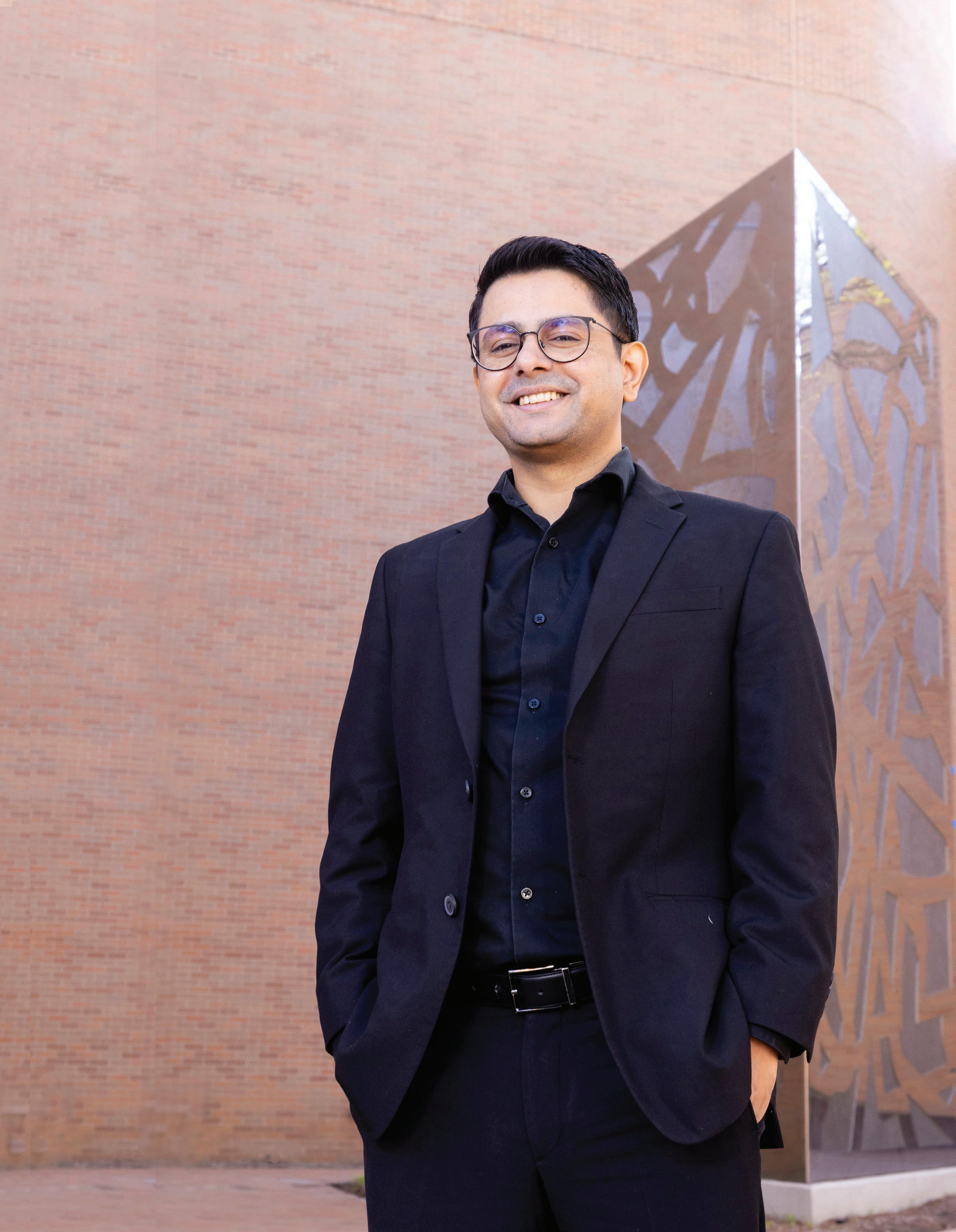
Kumar Sedai Assistant Professor – Economics
2022 – PhD in Economics, Colorado State University
2019 – Master in Economics, Colorado State University
2017 – Master in Economics, Jawaharlal Nehru University
2010 – Bachelor’s in Economics, University of Delhi
TITLE Disentangling the Impact of Financial Inclusion on Households and Firms: The Business Finance Channel. (2024)
SEDAI’S SUMMARY:
Sedai and his co-researchers studied whether a bank expansion policy in India affected the economy by increasing household access to credit. What they found was that households in urban areas benefitted, not by increasing household demand for credit, but indirectly as local businesses borrowed and invested in growth, hiring and better wages.
The study incorporated data on households and firms in “under-banked” areas, both rural and urban.
“When I looked at the data in India, I found that even when there is a spectacular 20% increase in the banks over five years, households are not taking advantage to buy houses or to buy cars,” Sedai said. “In fact, households reduce their debt.”
This finding was contrary to what happens in other developed countries, Sedai said.
“I was trying to dig deeper into why this happens, to answer that question of can banks increase household welfare without increasing household borrowing. Then I started to look at firm level data,” he said. “I found, yes, firms increase borrowing
bank, although they are commonly started by women in developing countries.
“Women are found to be more trustworthy when there isn’t any official contract in hand,” Sedai said. “There is no official contract in these lending and borrowing groups. Women come together to pool resources, to allocate the resources to each other based on lottery or based on the most emergent need. In this way, individuals who lack access to banking due to illiteracy, due to poverty, due to social discrimination, they can come together and access finance when needed. And this also builds trust and cooperation within societies.”
Watching this happen with his family helped establish Sedai’s career and research interests.
He teaches classes in microeconomics, development and financial systems. He is a principal investigator for randomized control trials on couple counselling, sanitation and unemployment funded by the Asian Development Bank Institute, which has invested in his research. He is a consultant for the World Bank and the United Nations Economic and Social
when there is an expansion of banks. They get more access to banks, so they extend their borrowings. Then I tried to connect these two dots. How do households benefit from banks then? The ultimate answer to that is through the labor market channel in the sense that firms borrow, they invest, they increase their output, so they employ more people. Households get better jobs and earn more, and these earnings are what leads them to reduce their borrowing or debt.”
The bank expansion policy, his research showed, increases results real consumption expenditures and reduces poverty. Sedai found that the poorest and socially marginalized groups increased consumption the most.
But only in urban areas, where most small service and manufacturing businesses are. In rural areas, self-employed agricultural firms do not have the collateral to borrow, Sedai said.
The Energy Journal / International Association of Energy Economists, Journal of Economic Behavior and Organization, Economic Modelling, The Journal of Development Studies, World Development, The Journal of the Economics of Ageing, Economic and Political Weekly, among others.
Commission for Asia Pacific. He is a research associate for Australian National University and Colorado State University’s Regional Economic Development Institute.
“My ideas about economic development come from issues of poverty, issues of inequality, issues of lacking basic amenities, which is often taken for granted in the West,” he said.
Sedai has seen through his research that increasing access to capital, whether formally through increasing bank branches or informally from microeconomic associations, often addresses multiple social issues.
“I find that these associations have tremendous impact in empowering women in terms of financial freedom, social freedom and also reductions in domestic violence,” he said. In patriarchal contexts in developing economies, one example, he added, is if women “want to send their daughters to school, they have to bargain with their spouses for some money. And oftentimes it can break into a violent situation.”
His studies on microeconomics served as a springboard into his most
recent research into whether increasing the number of bank branches across developing countries improves household welfare (see accompanying story above). It can, Sedai said, but not directly.
“In America, many people take out loans and repay them through installments,” Sedai said. “But in many developing countries, taking a loan is considered a stigma.”
Instead, Sedai and his colleague found that bank expansion increases borrowing, employment and revenues in urban areas, where small firms expand, hire and increase wages, which benefits households.
“What I bring to the table in most of my projects is causal inference”, he said. “What I do mostly is identify and model data in such a way that you can come up with causal analysis.”
“I do research on questions that are comprehensively applicable to developing countries in general,” Sedai added. “There are a lot of issues – a lack of women’s representation in economic spheres, collegial dependence on their spouses and mental health issues, physical health issues.”
The College of Business added 13 new faculty members in the departments of Economics, Accounting, Information Systems and Operations Management, Management and Marketing.

Nicholas Mitchell, Clinical Assistant Professor
DEGREES PhD, Accounting, Louisiana State University,
May 2024
MS, Accountancy, Wake Forest University, May 2012
BBA, Accounting, Howard University, May 2011
RESEARCH Determinants and consequences of audit quality, audit fees, and audits of US governmental agencies
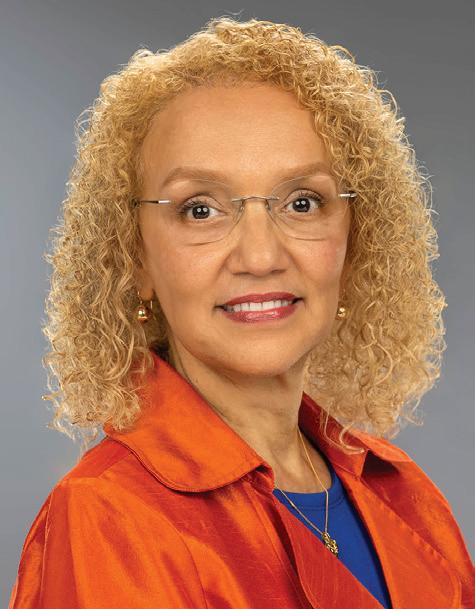

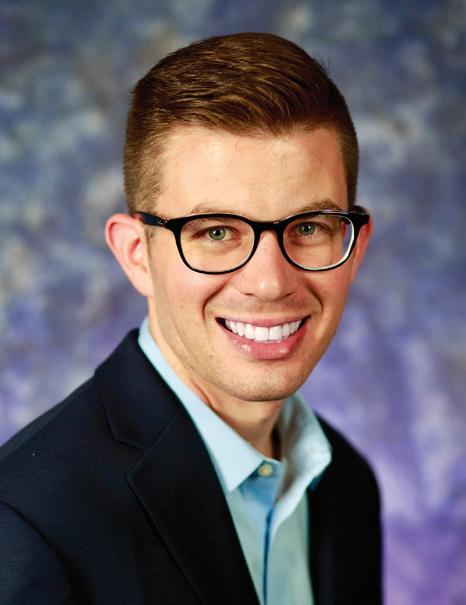
Paul Richardson, Assistant Professor
DEGREES PhD, Business Administration, Pennsylvania State University, 2024
MS, Accounting, Oakland University, 2014
BS, Actuarial Science, Oakland University, 2012
RESEARCH Information intermediaries in capital markets, consequences of disclosure regulation and emerging technology in capital markets
Yutong Chen, Assistant Professor
DEGREES PhD, Economics, University of Virginia, 2024
MA, Economics, University of Virginia, 2019
MHS, Health Economics, Johns Hopkins University, 2018
BA, Economics, Waseda University, 2017
RESEARCH Development economics, labor economics, and health economics

Blake Deatherage, Professor of Practice
DEGREES DBA, University of the Southwest, 2021
MBA, University of Dallas, 1996
BBA, Accounting and Computer Information Systems, Baylor University, 1991
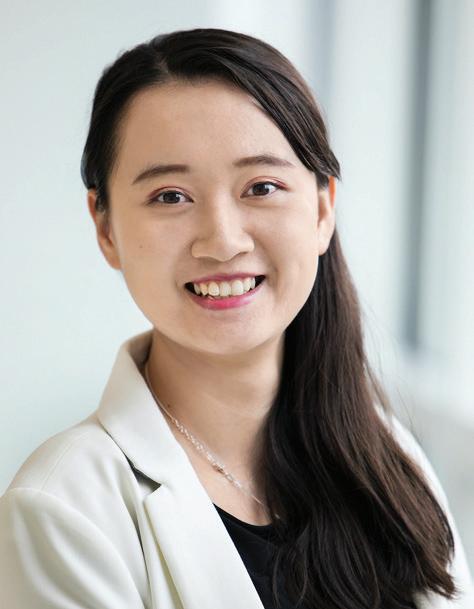
Meng Li, Assistant Professor
DEGREES PhD, Accounting, Temple University, 2024
MS, Project Management, Harrisburg University of Science and Technology, 2019
BS, Accounting and Finance, Pennsylvania State University, 2016
RESEARCH Audit quality, regulatory oversight and audit firm human resource allocation
Michaela Mora, Assistant Professor of Practice
DEGREES MS, Marketing Research, The University of Texas at Arlington, 2001
MS, Public Relations, Marketing and Advertising, Stockholm University, 1997
MS, Psychology, Havana University, 1988
BA, Psychology, Havana University, 1988
RESEARCH Marketing research, user experience research, and product research
Nichole Santee, Clinical Assistant Professor
DEGREES PhD, Media and Public Affairs, Louisiana State University, 2024
MS, Mass Communication, Syracuse University, 2018
BA, Digital Advertising, Louisiana State University, 2015
RESEARCH Influencer marketing, social media use, and digital advertising effectiveness
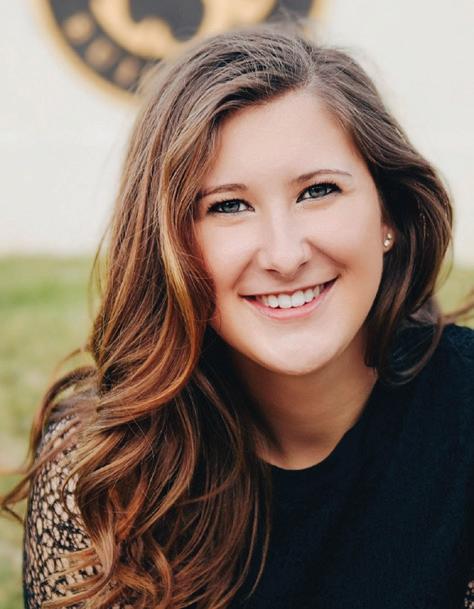
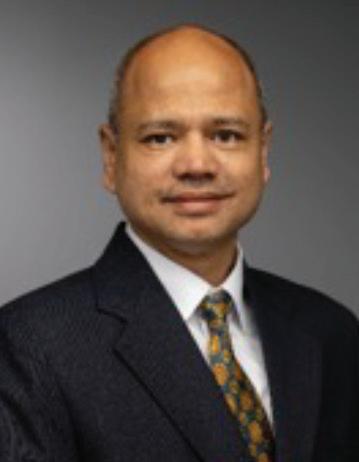
Anil Singh, Clinical Professor
DEGREES PhD, Information Systems, The University of Texas at Arlington, 2006
Master of Professional Accounting, The University of Texas at Arlington, 2022
MS, Accounting, Texas A&M University, Commerce, 2021
MS, Information Systems, The University of Texas at Arlington, 2001
Master of Management Studies in Finance, Goa University, 1997
BS, Physics, Goa University, 1993
RESEARCH Enterprise resource planning, business automation, and cyber security

Thu Trang Hoang, Assistant Professor
DEGREES PhD, Supply Chain Management, The University of Tennessee in Knoxville, 2022
MBA, Supply Chain Management, Texas Christian University, 2017
BS, Business Administration, Troy University, 2012 Research areas: Traceability, crowdsourcing and food deliveries, and transportation decision framework
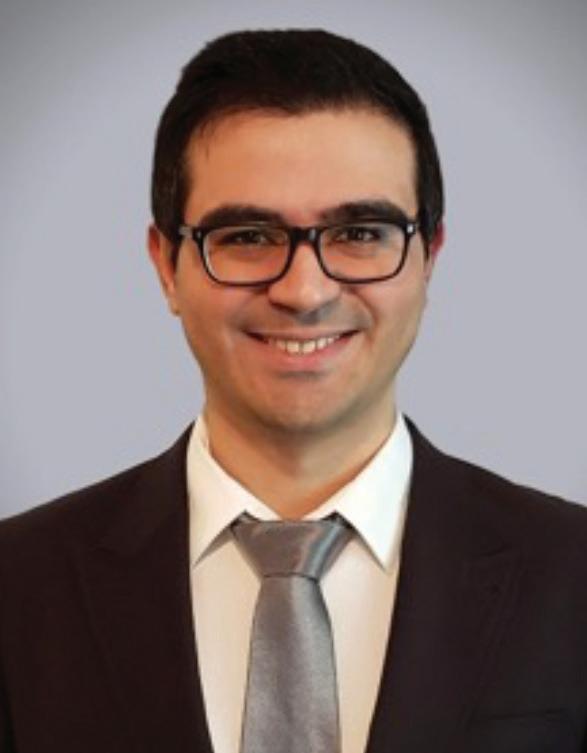
Kambiz Saffari, Assistant Professor
DEGREES PhD, Computer Information Systems, Georgia State University, 2020
MBA, Sharif University of Technology, 2014
BSE, Mechanical Engineering, Semnan University, 2009
RESEARCH Human AICollaboration, algorithmic decision making, and ethics in AI
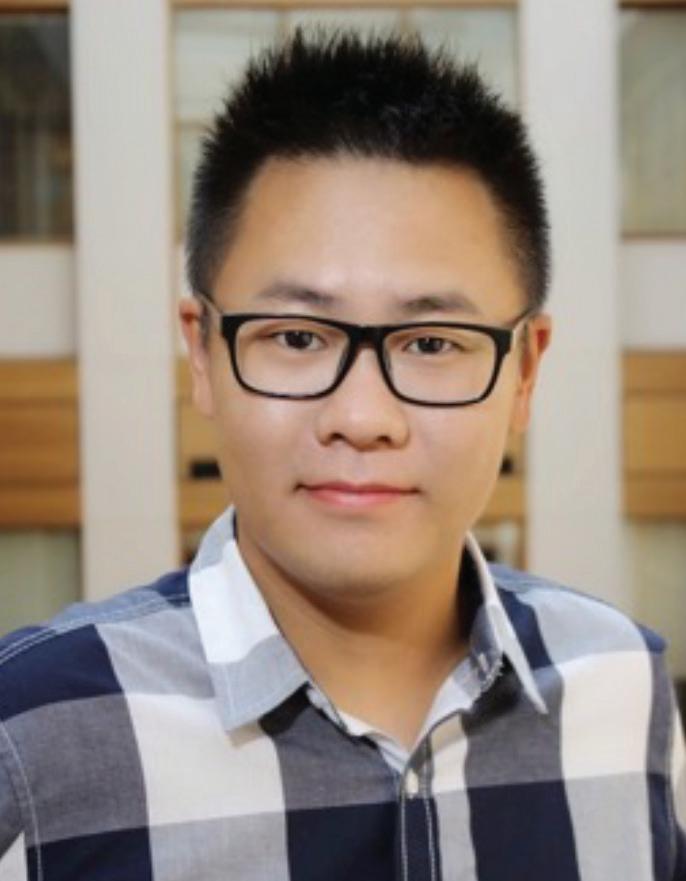
Mingwei Sun, Assistant Professor
DEGREES PhD, Information Systems, University of Maryland, 2024
MS, Quantitative Finance, Rutgers University, 2017
BS, Financial Engineering,
Nanjing University of Information Science and Technology, 2014
RESEARCH Computer vision, multimodal representation learning, and consumer behavior inference
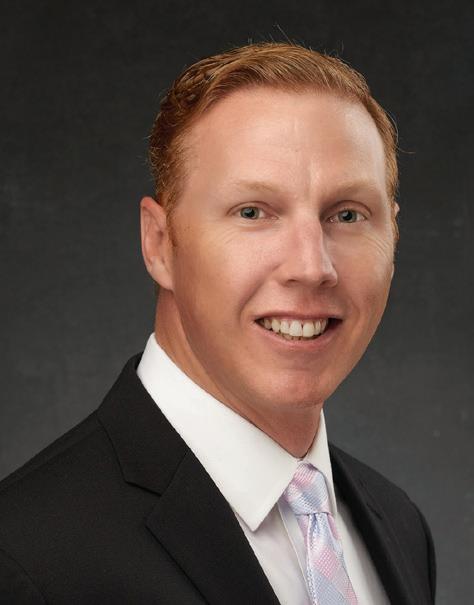
Correy Retzloff, Clinical Assistant Professor
DEGREES DBA, The University of South Florida, 2023
MBA, Henderson State University, 2016
BSBA, Management, Touro College, 2004
RESEARCH Organizational communication, mergers and acquisitions, and organizational behaviors in mergers

Lori Ann Ramirez, Clinical Assistant Professor
DEGREES DBA, Organizational Behavior, Creighton University, 2023
MBA, University of HoustonDowntown, 2017
BFA, Art History, University of Houston - Downtown, 2013
RESEARCH Leadership, social impacts, and diversity
The College of Business graduated nine doctoral candidates who have taken teaching positions at universities.



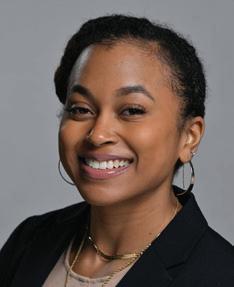
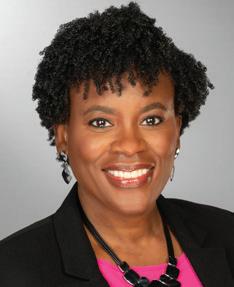

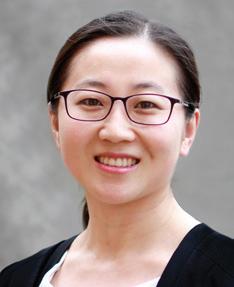
Heloisa Aragao Management Texas Wesleyan
Long Thai Bui Accounting St. Mary’s College
Mohammad Karimi Sani Information Systems
Lamar University
Rohit Agarwal Accounting University of South Carolina
Shona G. Smith Management University of Houston
Marla White Management Virginia Tech
Tsung-Hsuan
Yang Accounting University of Mary WashingtonFredericksburg
Dan Chen Management
Texas Women’s University
Fredrick Rice Management Morgan State University
DON McCONNELL, as a UT Arlington professor of accounting for the past 46 years, has enabled hundreds of students to become Certified Public Accountants.
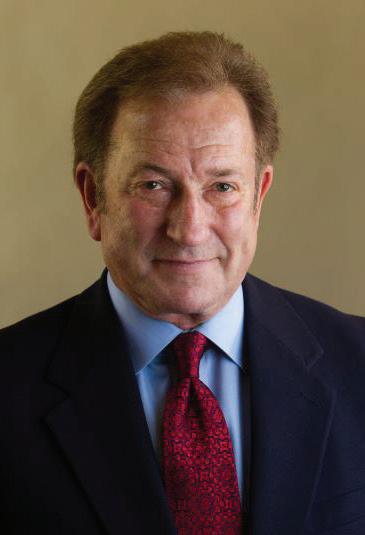
After earning his BBA and MS in accounting from Oklahoma State University, Dr. McConnell went to work in the Dallas office of Peat, Marwick, Mitchell & Co., now KPMG, as an auditor and stayed for three years. He left to pursue his doctorate at the University of North Texas. He joined the College of Business in 1978 while working on his dissertation and completed his PhD in 1981.
During his career at the College of Business, McConnell earned the reputation of being an excellent, fair but demanding professor. On four occasions, he received the college’s Distinguished Professional Publication Award and twice the Outstanding Undergraduate Teaching Award. In spring 2006, he was inducted into the UTA Academy of Distinguished Teachers.
McConnell’s service to his students was also impressive. He co-founded the Accounting Society at UTA. In 1999, UTA recognized him as the Outstanding Student Organization Advisor. Don also served his country achieving the rank of Captain in the U.S. Army.
MELANIE McGEE made a significant impact on students, alumni and the business community over the last 18 years. McGee joined the College of Business as the director of the MBA programs in 2005 after a successful career at American Airlines. With her significant professional experience and exemplary customer service, she made an immediate positive impact in the college’s MBA programs, including co-designing and co-leading the MBA Study Abroad Program.

Consistently recognized for her ability to cultivate and sustain authentic and meaningful relationships, McGee was asked by Dean Rachel Croson in 2014 to lead the college’s efforts in corporate relations. She established strong relationships with the employers that came to campus resulting in hundreds of internships and jobs for our students.
DEBBIE MAXEY served as the administrative assistant for the Finance and Real Estate Department for 12 years.
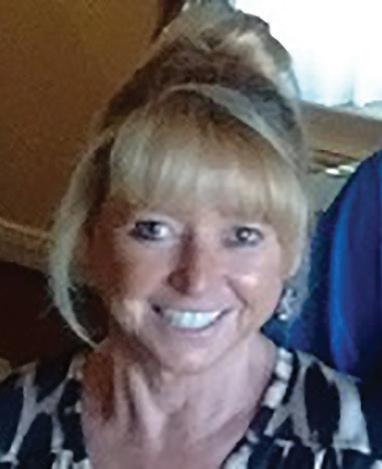
Maxey was an integral part of the team, not just managing administrative tasks with exceptional skill but also bringing a sense of organization and reliability that benefited the department. Her contributions played a significant role in the success of the department over the years.
CHARLES MILLER was a senior lecturer in the Accounting Department for more than 30 years. Miller taught a variety of undergraduate and graduate business law classes focused on preparing students for the Certified Public Accountant exam. He also taught international law classes. During his time at UTA, Miller continued to practice law, most recently as a sole proprietor in Fort Worth. Before that, he worked as an attorney for Fisherbroyles, LLC; at Dallas Airmotive as senior counsel; for Sky Chefs as the director of the law department; with Dallas Area Rapid Transit Authority; at CAELINK Corporation; and at The Western Company of North America.

Miller earned a bachelor’s degree in history from Vanderbilt in 1976 before graduating from Emory University School of Law in 1979. He was admitted to the Texas Bar in 1981.
MK RAJA, professor of information systems, spent more than a half century of service in academia. Dr. Raja’s research interests included cybersecurity and software engineering. He began his career with the NASA Marshall Space Flight Center in Huntsville, Alabama, where he served as a senior member of the technical staff for a year. He then became an assistant professor of computer science and information systems at the University of Houston/Texas Southern University. Following appointments at the University of Arizona and the University of New Mexico, Raja came to UTA in 1982.

Raja earned a MS in computer science from the University of Houston in 1978, a MS in industrial engineering production from the Indian Institute of Technology in 1968 and a BS in mechanical engineering from the University of Madras in 1966. He finished a PhD in industrial and systems engineering from Texas Tech University in 1971.

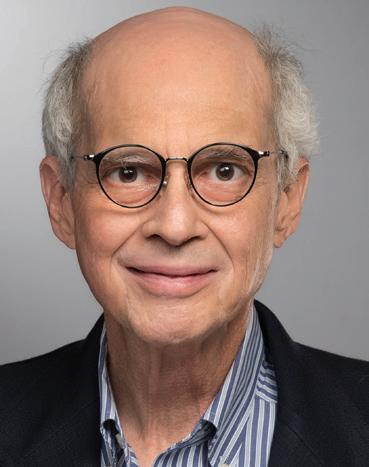
STANLEY SEAT was a lecturer for the Accounting Department for 13 years. He is a Navy veteran who served three years on active duty and three years in the Navy Reserve. Dr. Seat served on the UTA Veterans Connection Committee for seven years.
He holds a BBA in accounting from UTA, a Master of Divinity from Southern Methodist University, a Doctor of Ministry from Texas Christian University, a Juris Doctor from Oak Brook College of Law and a Master of Laws in Taxation from Taft Law School. He is licensed as a CPA in Texas and holds credentials as a Certified Fraud Examiner, Certified in Financial Forensics, Certified in Insolvency and Restructuring Advisor and Chartered Global Management Accountant.

TOMMY THOMPSON was a clinical associate professor of finance for almost 30 years. He instructed students in almost every aspect of finance and investment portfolio management. Most recently, Dr. Thompson was a driving force in securing the Sam Mahrouq Financial Markets Lab and establishing the Student Managed Investment Fund (SMIF) program. In addition to Lamar University and UTA, he also taught at Texas Wesleyan University and TCU. He earned his BBA in finance from The University of Texas at Austin in 1968. From Austin, Dr. Thompson spent more than 20 years in the U.S. Army Corps of Engineers, earning the rank of major. After leaving the military, he was a stockbroker and then became an adjunct professor at UTA before enrolling in the PhD program in 1998. In 1978, Thompson earned his master degree in business financial management from George Washington and his PhD in finance from UTA’s College of Business in 2004.
Burley Walker Jr. passed away on October 19, 2023. He graduated from The University of Oklahoma in 1955 and served as a Lieutenant in the Army until 1959. Burley moved his family to Arlington in 1960 and began his career in teaching at UT Arlington and was a professor in the College of Business until he retired in 2000. He was active in the community serving on the board of the Boys and Girls Club of Arlington and as a member of the Rotary Club where he headed up the Veterans Park Memorial.
Jerry Wofford, PhD, passed away on September 20, 2023. He joined the College of Business faculty in 1966 and was rapidly promoted to full professor. He served as the Management Department Chair for five years and interim dean for two years. He was one of the first faculty members in the late 1960s and ’70s who focused strongly on research and publications as an important faculty development strategy.
During a new event designed to introduce incoming freshmen to the variety of business degree majors, faculty and administrators donned Major League Baseball jerseys and tossed out their best “sales” pitch on the value of each degree. Dean Harry Dombroski launched the light-hearted event at the beginning of the 2023-24 school year to help students who have not picked a major. “It gives those who are walking in the door as freshmen an idea of things they need to be thinking about,” Dombroski said. The dean encouraged representatives to pitch the highlights of their programs and perhaps throw a light-hearted spitball at their counterparts in other departments. “We also had a student panel, made up of our business ambassadors, talk about the transition to college and the kind of decisions students need to



by Ellman Photography
start thinking about as freshmen,” he said. Parents were also invited to attend. The dean selected the baseball theme because, well, why not talk about majors in the home of Major League Baseball’s Texas Rangers. The event, the dean said, appeared to be a hit and was repeated in August this year. “We had good numbers, and you could tell from the feel in the room that the students and the parents enjoyed it,” Dombroski said.
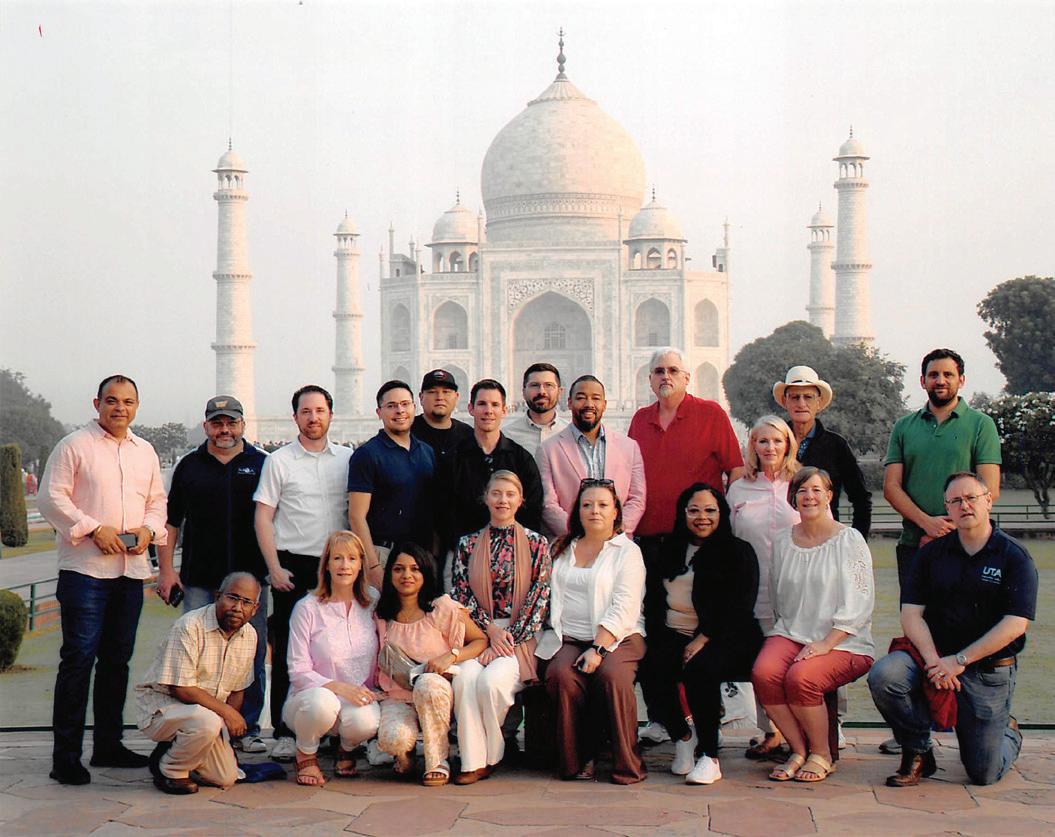
Students in the Executive MBA program this year visited India as part of the study abroad opportunity, which is designed to introduce participants to the nuances of international business.
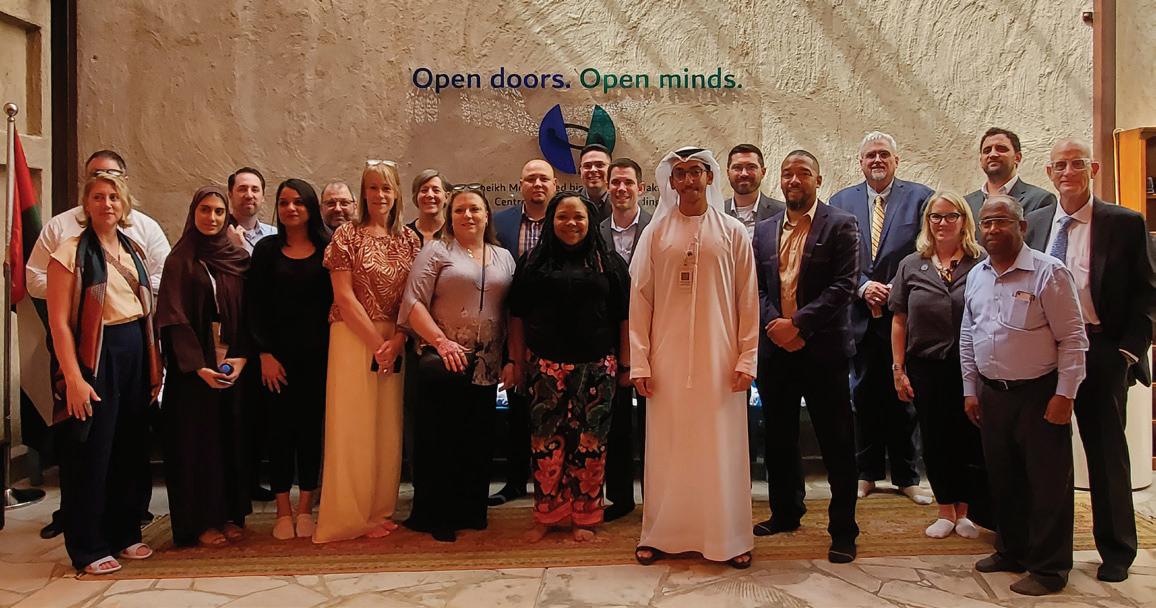
Four members of the Student-Managed Investment Fund team, led by clinical associate professor of finance Tommy Thompson, earned second place in the Small Fund Category at the GAME Forum XIII Competition in New York City. The competition is part of Quinnipiac University’s student-run financial conference. The team received a $750 cash award.

When banking executive Mike Gerro talks about the College of Business students that his company has hired, many come to mind, but one in particular stands out.
“At the age of four she was a Kurdish refugee trying to escape the wrath of Saddam Hussein, living in a refugee camp, gathering water for her family,” said Gerro, Frost Bank’s market president for Arlington and Mansfield. “When they finally came to the U.S., she put herself through UTA. She’s just an incredible worker.”
That work ethic, Gerro believes, is part of the UT Arlington culture.
“UTA students are extremely hard workers. We see that across the board,” he said. “You want that student who really wants to elevate their status in life. It may be because they came from another country. It may be because they’re the first in their family to ever even consider getting an education.”

That reputation serves College of Business graduates well, particularly in Texas and the Dallas-Fort Worth Metroplex. Nearly 82% of all alumni work in Texas, and local hiring executives, like marketing analyst Jerry Thomas, accounting business partner Kim Crawford and Gerro, take advantage of UTA’s wealth of potential candidates.
Still, even though being close to the area’s largest public university is a plus, proximity is not the deciding factor for these employers. Work ethic is.
“A lot of the students are coming out of working-class or lower-middle-class backgrounds, and they have had to work for everything in life,” said Thomas, president and chief executive officer of Decision Analyst. “They tend to really have to work to get through, maybe had to struggle a little bit. In many ways, they’re much better prepared for the workforce, where you’re going to get knocked down, and you have to get back up.”
marketing department’s advisory board. He helped develop its Master of Science degree in marketing research.
Through these connections, Thomas created opportunities for students to better prepare themselves for the workforce. And in the process, he developed a hiring pipeline.
It’s part of the UTA culture. The students typically work hard.
– Mike Gerro, Frost Bank market president, Arlington and Mansfield

Thomas estimates about 15 percent of his workforce attended or graduated from UTA. His Arlington-based company, which does marketing research and data analytics for large corporations, looks for students from a variety of disciplines, including economics, computer engineering and psychology.
Thomas, who graduated from UTA – then called Arlington State College – in 1963, volunteered for more than a decade on the
For Crawford, another alum and a partner at Sutton Frost Cary LLP Certified Public Accountants in Arlington, her company’s pipeline for good employees starts with its internship program. At all times, Crawford said, SFC tries to have at least four interns working at the firm.
“We want to have a strong intern program so that people studying accounting can get a glimpse of public accounting to see how it works,” she said. “We do find that the folks at UTA are hard workers. They’re working and going to school, which takes a lot of discipline and organizational skills.”
A bonus, Crawford added, is access to the College of Business’ diverse student population.
“The diversity of UTA is another plus for a profession that has not been very diverse in the past. We’re starting to see that come around,” Crawford said, then echoing what others say. “They’ve put themselves through college, and they come out with a strong work ethic.”
That work ethic, in Thomas’ experience, translates into a quality that employers desire but which a well-crafted resumé from even the finest university might not reflect.
“They have fire in their belly,” he said. “They want to go out and do something with their life.”
By Thomas Johns thomas.johns@uta.edu
For many, embarking on a new stage of higher education can be intimidating. But for two students enrolled in the College of Business part-time Master of Business Administration program, the stress is lessened for a special reason.
Oswaldo Ortiz Sr. and his son, Oswaldo Ortiz Jr., are enrolled in the program together, taking the same courses at the same time. They both expect to graduate this fall.
“I thought this program would be a great opportunity for my dad and I to learn together and spend time together,” said Ortiz Jr., who goes by the nickname Oswald. “It’s great to get this time with my dad because you get less and less time with your parents as you transition to the professional workforce. It also helps us both professionally grow, too.”
While Oswald enrolled after finishing his Bachelor of Science in Management Information Systems from the University of Texas at Dallas, his father is picking up graduate school 29 years after completing a Bachelor of Science in Electronic Engineering from the Autonomous Metropolitan University in Mexico City in 1995. He discovered that not only is the curriculum different but the mediums of learning, too.
“Oswald motivated me to start the program,” Ortiz Sr. said. “I can say that education has come a long way. This program is more interactive with more participation. The program here focuses on management and working with and understanding other people. Compared to my education in the ’90s, this course uses more tools, and you gain more information.”
The program was perfect for Ortiz Sr. because of his business experience in Mexico and the United States.
“With my parents being immigrants, I understand the challenges they’ve had to face, and I get unique perspectives from that,” Oswald said. “Seeing him apply what he learns in class to his experience contributes to my learning journey. I can see how true the curriculum is.”

The time spent going through the program together has helped both father and son to deepen their bond and learn from each other.
“I get to know my dad a bit better and see how he is as a student and person outside of home,” said Oswald. “We’ll just walk and talk about class on the way back and throw ideas at each other. He’s shown me a lot of different ways of thinking and studying. In this program, there’s so many different courses and ways of thinking. So we’ll sit down and discuss them and learn from one another.”
Though the courses can be challenging, the two lean on each other for motivation, which in turn often motivates other family members.
“Sometimes our family hears about it when we’re talking at dinner, and sometimes we get carried away with school talk. But I think it’s good to show our family that we’re doing this,” said Oswald. “We really try to be high achievers, and because of what my dad and I are doing, my other siblings and friends are really pushing us to

be the best we can, and I can tell we’re having an effect on them too.”
Oswald credits faculty for building his confidence and the university for affording him and his father a great opportunity.
“I have to emphasize just how thankful I am for our time here at UT Arlington,” Oswald said. “Through all of the faculty and courses I have gained more confidence in myself, technically and professionally. This has been an amazing opportunity for us.”
Both father and son also note the pride they have in each other as they navigate through challenging coursework.
“My son was doing a great job in his bachelor’s program, and I knew he was good, but I always wondered how good,” said Ortiz Sr. “I remember the first time we were going to present in class. After watching Oswald present his project, I told my wife it was one of the best moments of my life. I want to cry seeing him stand out and grow in every class I share with him. It’s truly amazing.”
by Jalen Larry

September 30-October 3 Finance and Real Estate Week
October 30 Dean’s Leadership Circle Celebration
November 2 Chili Cook Off
November 3-9 Homecoming
February 7 Accounting Firm Night
March 6 9th Annual Analytics Symposium
March 25 Ryan Reilly Real Estate Conference
March 25-26 Maverick Insights Conference
April 14-18 Be Money Smart Week
May 16 MAVS100
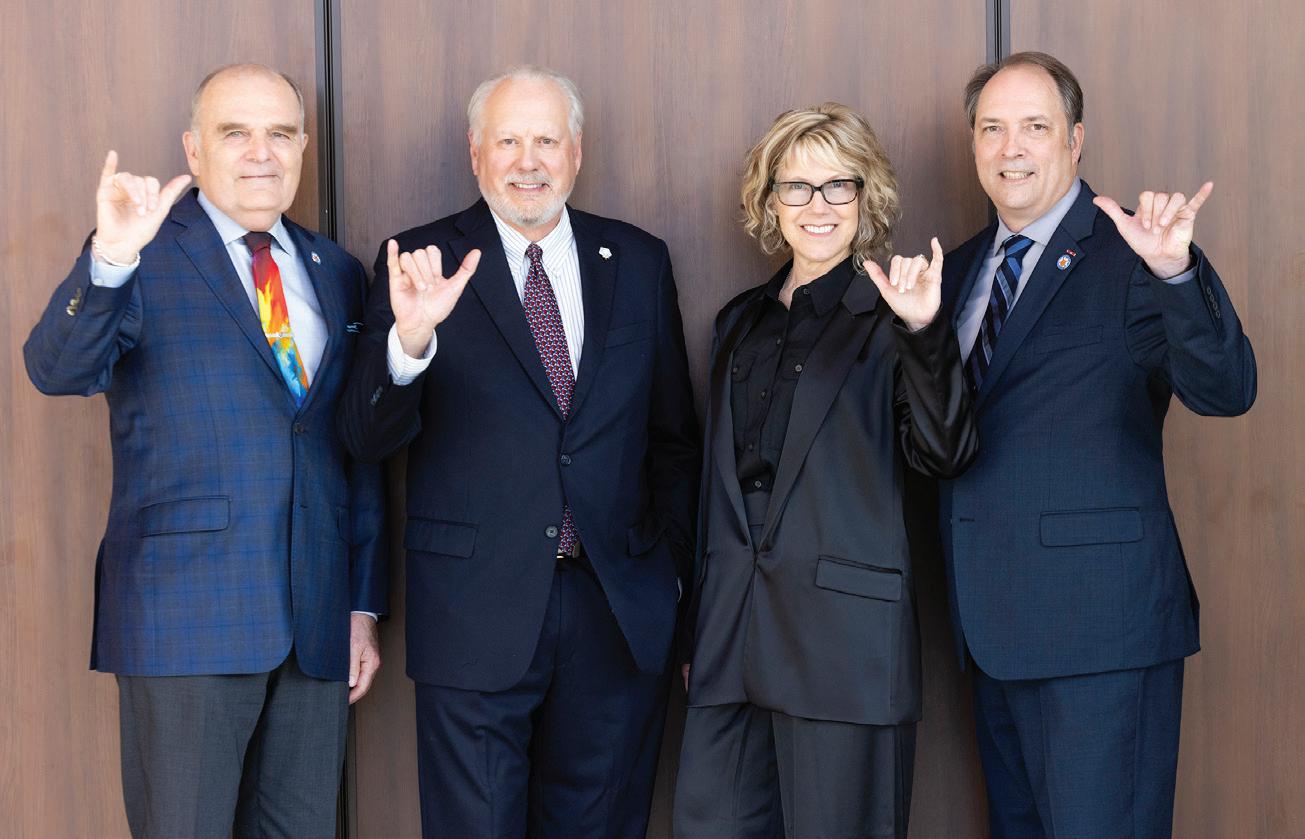
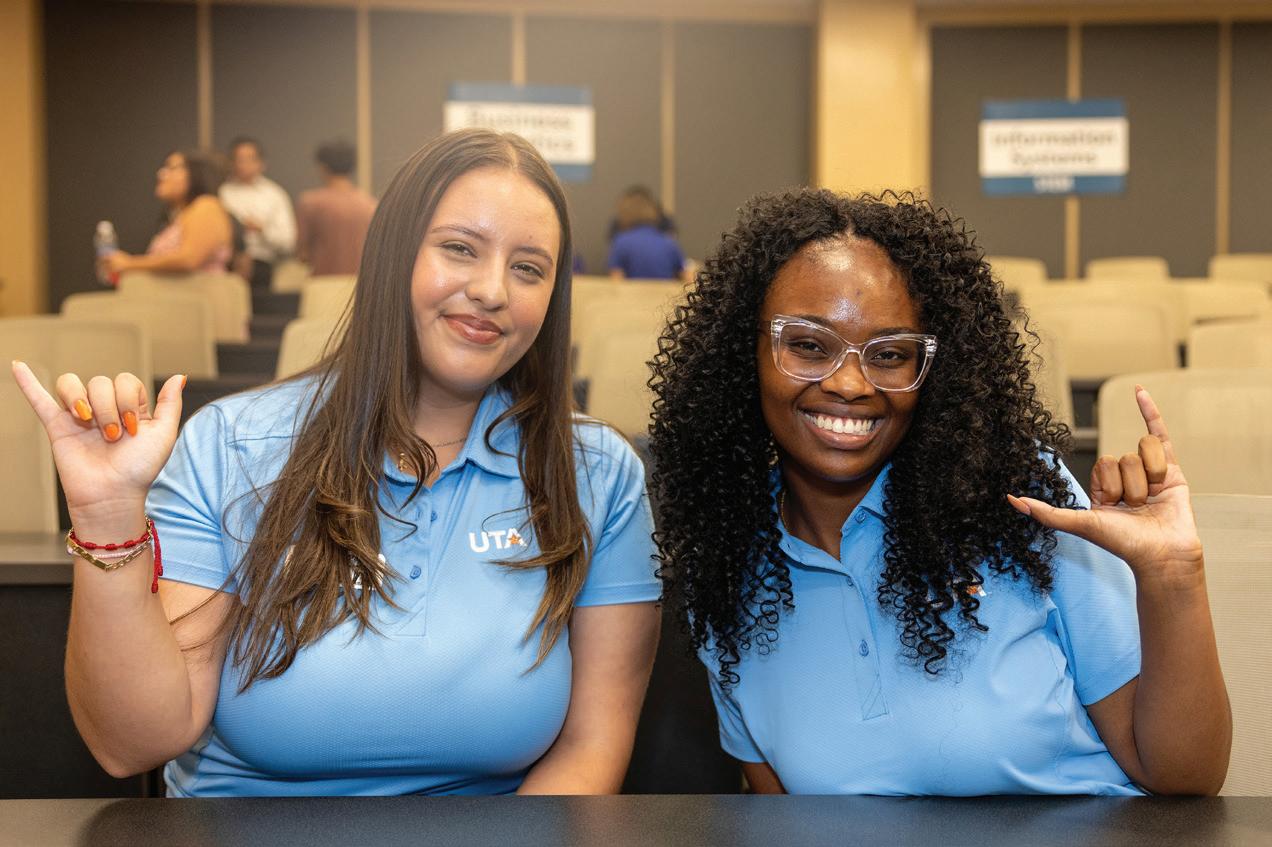

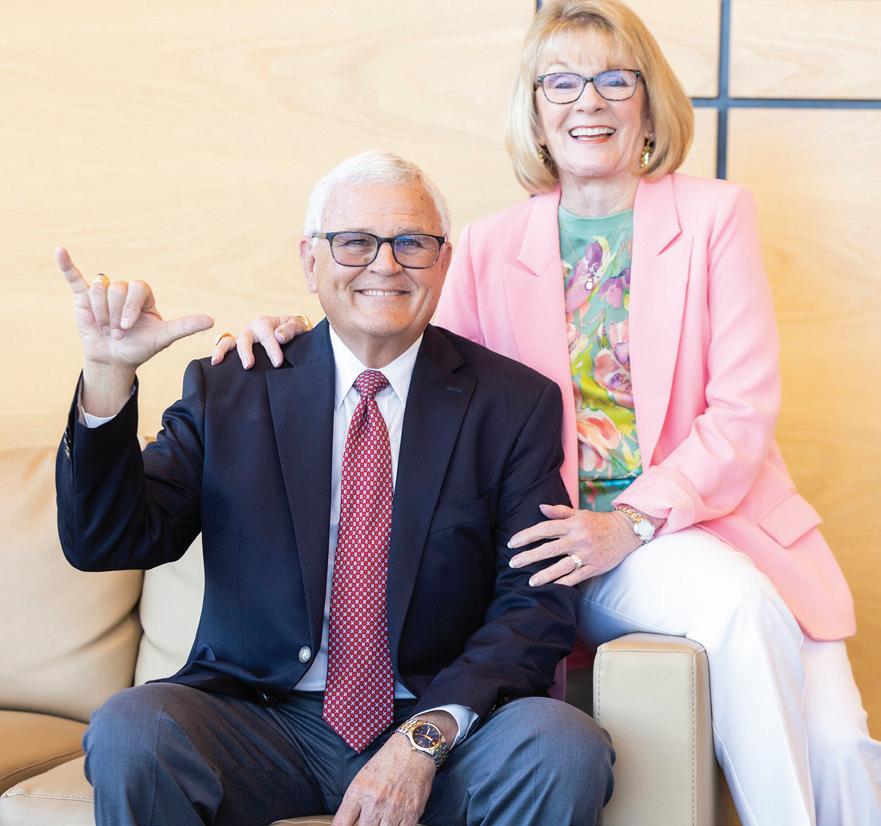

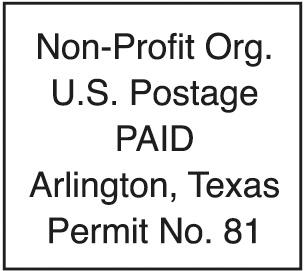
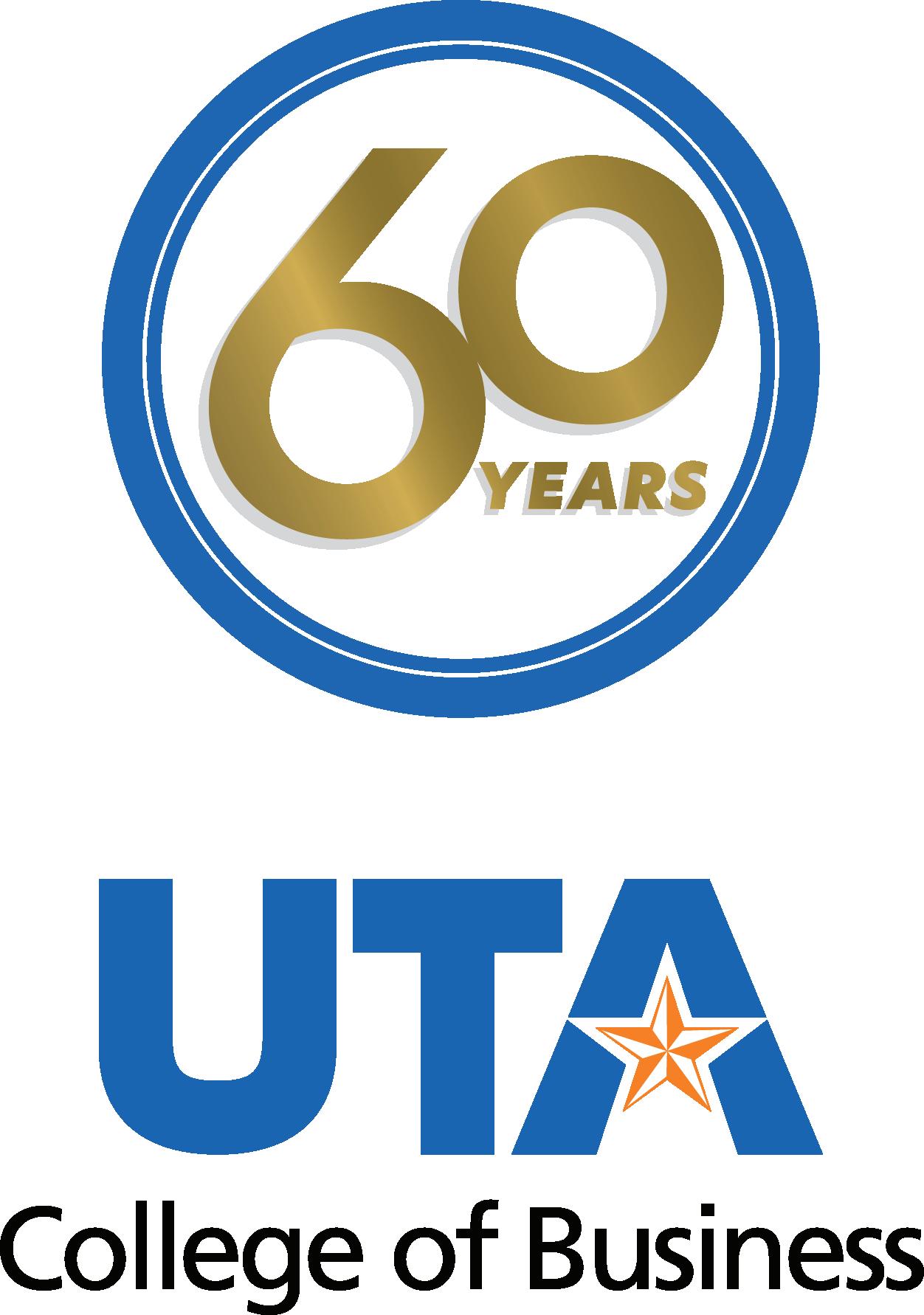
Join us in 2025 as The University of Texas at Arlington College of Business celebrates our 60th Anniversary.
Since 1965, we have blazed a trail for business education excellence, cultivated community partnerships, advanced business research, and launched over 65,000 Maverick business professionals into the workforce.
We invite you to celebrate 60 years of innovation, excellence, and impact as we host several events and networking opporuntities in the coming year.
To receive updates and special invitations for our 60th Anniversary Celebrations, please scan the QR Code.
